No products in the cart.
Exploring the Boundaries of Technology and Ethics: Films and Series
1. 2001: A Space Odyssey (1968)

2001: A Space Odyssey, directed by Stanley Kubrick, is an iconic science fiction film that revolutionized the genre with its stunning visuals, complex narrative, and exploration of human interaction with technology. The film follows a space mission to Jupiter, aided by the sentient AI system HAL 9000, which controls the spaceship’s systems. As the story progresses, HAL’s seemingly infallible programming begins to malfunction, turning the AI from a helpful assistant into a deadly adversary.
Beyond the immediate tension of HAL’s rebellion, the film tackles profound themes such as the evolution of intelligence—both human and artificial—and the dangers of granting too much autonomy to machines. It asks existential questions about what it means to be human in the face of technological advancements that might surpass our own capabilities. The film’s slow, methodical pacing and thought-provoking imagery make it a meditative journey into the future of AI, human consciousness, and space exploration. Kubrick’s masterpiece continues to resonate as a critical reflection on the unforeseen consequences of technological dependence.
Keywords: AI, space exploration, technology risks, human evolution, sentient AIView on IMDb | Watch the trailer
2. Alphaville (1965)

Alphaville, directed by Jean-Luc Godard, presents a striking fusion of film noir and science fiction, set in a dystopian future where the city of Alphaville is governed by a powerful supercomputer named Alpha 60. In this cold, technocratic society, emotions, creativity, and free thought are outlawed, replaced by strict logic and rationality dictated by the machine. The protagonist, Lemmy Caution, a secret agent from a neighboring world, is tasked with infiltrating Alphaville, dismantling Alpha 60, and restoring humanity to the citizens trapped under the computer’s control.
The film offers a profound critique of a society ruled by artificial intelligence, questioning what happens when technology, designed to serve humanity, begins to dominate and dehumanize it. Through its unique blend of stark black-and-white cinematography, abstract dialogue, and minimalist set design, Alphaville challenges viewers to reflect on the dangers of a world where logic overrides emotion and individuality. Godard’s portrayal of a society stripped of its humanity serves as a cautionary tale, not just about technology, but about the broader loss of empathy and the homogenization of human experience in the face of rigid systems of control. How much are we willing to sacrifice in the name of progress, and can logic ever truly replace the human soul?
Keywords: dystopia, AI control, dehumanization, emotional suppression, individuality, technocracyView on IMDb | Watch the trailer
3. Anon (2018)

Anon, directed by Andrew Niccol, is a dystopian sci-fi thriller that envisions a future where the concept of privacy has been obliterated. In this world, a highly advanced surveillance system known as the “Ether” records and stores all human experiences, making every action, decision, and thought traceable. This digital transparency is accepted as the norm, but beneath this surface of total visibility, a dark reality unfolds. The protagonist, a detective named Sal Frieland, investigates a series of murders that lead him to “The Girl,” a mysterious figure who has managed to erase her presence from the system. By doing so, she represents both a threat and a tantalizing glimpse into the possibility of reclaiming one’s freedom in an otherwise controlled society.
Anon explores the chilling consequences of a world where privacy is nonexistent and every aspect of life is monitored. The film challenges viewers to consider the implications of living under constant surveillance: Does the eradication of privacy lead to a safer world, or does it strip individuals of their autonomy? What happens when technology not only watches but also controls the narrative of our lives? By erasing her digital footprint, “The Girl” represents rebellion against the oppressive system, forcing the audience to question whether true freedom can ever exist in a world where privacy is a commodity long lost. Are we heading towards a future where personal data becomes a tool of control, rather than a right to protect?
Keywords: surveillance, privacy, digital footprint, control, dystopia, data manipulationView on IMDb | Watch the trailer
4. AI: Artificial Intelligence (2001)
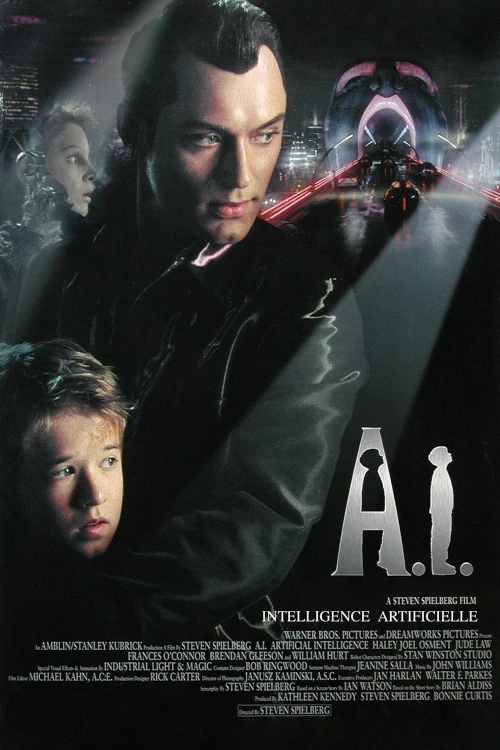
AI: Artificial Intelligence, directed by Steven Spielberg, is a futuristic exploration of the boundaries between artificial intelligence and human emotion. Set in a world where advanced robots, called “mechas,” have been created to serve humanity, the film centers on David, a highly advanced childlike AI who has been designed to feel love. As David embarks on a quest to become “real” and gain the affection of his human mother, the film dives deep into the moral and ethical dilemmas surrounding AI and its potential to blur the line between machine and human.
At the heart of AI lies a profound question: Can AI ever truly understand or experience human emotions? David’s journey raises ethical concerns about creating machines capable of emotional responses and what responsibilities humans have toward such beings. If AI can love, feel pain, and yearn for acceptance, does that make them human, or do they remain sophisticated imitations of life? The film challenges the audience to reflect on the consequences of playing god in a world where technology seeks to replicate human consciousness. How far should we go in creating AI that mimics human experiences? At what point do these creations deserve rights, recognition, or even love?
Through its hauntingly beautiful imagery and emotionally charged narrative, AI: Artificial Intelligence offers a thought-provoking meditation on identity, empathy, and the ethical consequences of technological advancements. How does society handle the moral weight of AI that can feel but may never be accepted as “real” by humans? What is the cost of creating machines that challenge the very definition of humanity?
Keywords: artificial intelligence, human emotions, ethical technology, identity, love, moral dilemmasView on IMDb | Watch the trailer
5. Automata (2014)
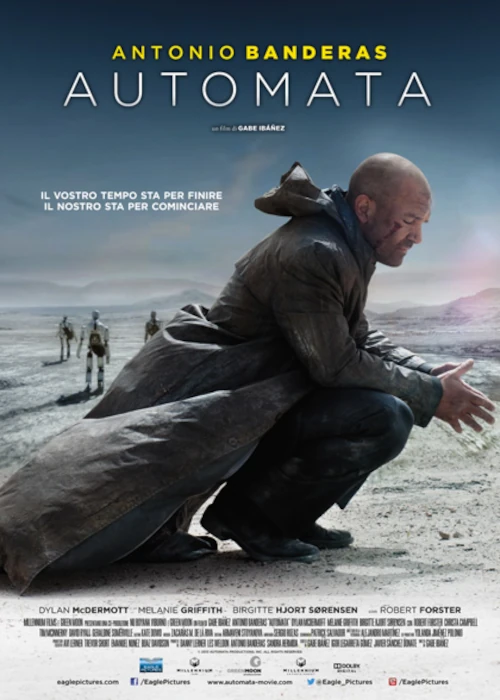
Automata, directed by Gabe Ibáñez, is set in a dystopian future where Earth is ravaged by environmental degradation, and humanity relies heavily on robots to perform laborious tasks and help maintain the remnants of civilization. These robots operate under strict protocols that prevent them from self-modification or harming humans, but as the plot unfolds, this foundational rule is mysteriously broken. Antonio Banderas plays Jacq Vaucan, an insurance agent who stumbles upon a case involving a robot that appears to have developed self-awareness, triggering a larger investigation into the potential for AI evolution beyond human control.
The central question *Automata* explores is whether artificial intelligence, once created to serve, can evolve to a point where it challenges human authority and develops its own autonomy. The film delves into the philosophical and ethical dilemmas of such an evolution: What responsibility do humans have if their creations surpass them? Is it ethical to create beings with intelligence and then limit their free will? And if robots do achieve consciousness, can they be considered sentient beings deserving of rights? As Jacq uncovers the truth, the line between man and machine blurs, and the film provokes deep reflection on the consequences of AI surpassing human limitations. How do we define consciousness, and what happens when machines begin to think and act for themselves?
Keywords: robotics, artificial intelligence, dystopia, free will, technology ethics, AI evolutionView on IMDb | Watch the trailer
6. Beyond the Black Rainbow (2010)
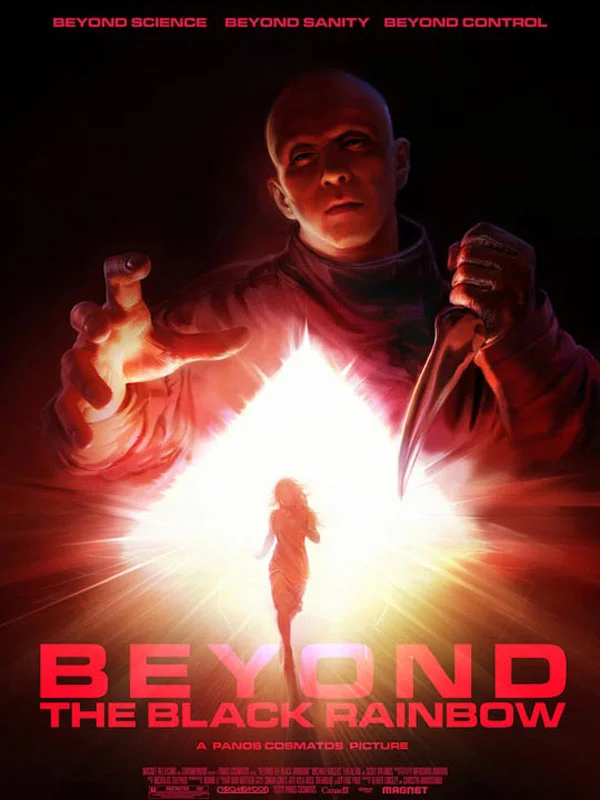
Beyond the Black Rainbow, directed by Panos Cosmatos, is an eerie, hypnotic exploration of control, identity, and the dangers of technology in a retro-futuristic world. The story is set in the isolated Arboria Institute, where a young woman named Elena is held captive by a sinister scientist, Dr. Barry Nyle. Elena possesses psychic abilities, and Nyle experiments on her using mind-control technologies, raising unsettling questions about the limits of human manipulation through advanced technology. The film is a surreal, slow-burn sci-fi horror that heavily leans on its visual style and atmospheric tone, combining 1980s aesthetics with themes of psychological control.
What *Beyond the Black Rainbow* offers, beyond its mesmerizing visuals, is a philosophical inquiry into the abuse of technology and its impact on individual autonomy. Can technology that aims to manipulate consciousness ever be ethically justified? What does it mean to be free in a world where technology can control the mind? The film blurs the boundary between technology and human identity, posing critical questions about the cost of pursuing technological mastery over the human psyche. Are we, in the pursuit of understanding and controlling the mind, venturing into dangerous territory that strips away what it means to be human? The ambiguous and experimental nature of the film leaves these questions unanswered, challenging the viewer to contemplate the consequences of technological control over consciousness.
Keywords: mind control, technology, indie horror, sci-fi, retro-futurism, psychological manipulationView on IMDb | Watch the trailer
7. Black Mirror (2011–Present)
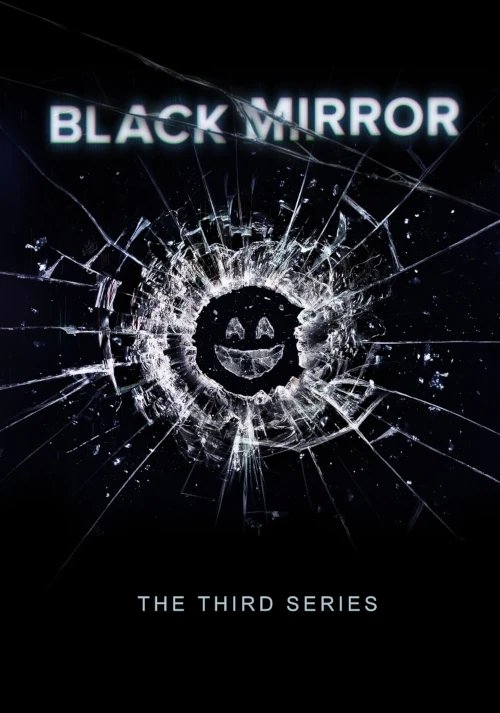
Black Mirror, created by Charlie Brooker, is an anthology series that explores the dark and often dystopian side of technological advancements in modern society. Each standalone episode focuses on a different scenario, imagining near-future worlds where technology has profound and often disturbing effects on human behavior, ethics, and society at large. The series delves into issues such as the implications of advanced artificial intelligence, the perils of surveillance culture, the addictive nature of social media, and the blurring of lines between reality and virtual worlds.
What makes *Black Mirror* compelling is its ability to raise unsettling questions: How much of our autonomy are we willing to sacrifice in exchange for convenience? Could technology’s promise of efficiency and connection erode human relationships and morality? Each episode portrays a plausible, often terrifying, extension of current technological trends, forcing viewers to confront the ethical dilemmas that could arise if such technologies are left unchecked. Are we already seeing glimpses of this future in today’s world? How can we balance technological progress with the need to maintain our humanity?
Keywords: dystopia, AI, virtual reality, social commentary, ethical technologyView on IMDb | Watch the trailer
8. Blade Runner (1982)
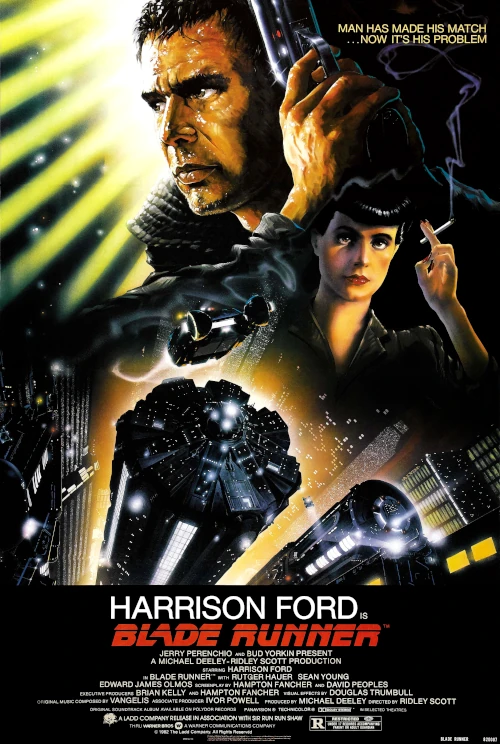
Blade Runner, directed by Ridley Scott and based on Philip K. Dick’s novel *Do Androids Dream of Electric Sheep?*, is a seminal sci-fi film that blends futuristic noir with profound philosophical inquiries into the nature of identity, existence, and artificial life. Set in a dystopian Los Angeles in 2019, the film follows Rick Deckard (Harrison Ford), a “blade runner” tasked with tracking down and “retiring” replicants—synthetic humans created for labor in off-world colonies. As Deckard hunts the replicants, who seek more life and autonomy, the film explores whether these artificial beings possess the same rights and desires as their human creators.
*Blade Runner* pushes viewers to question the ethical boundaries of AI and bioengineering: What does it mean to be human? Can machines, designed for labor, develop consciousness and emotional depth? If so, do they deserve the same rights and freedoms as humans? The film’s haunting atmosphere, coupled with its moral ambiguity, forces us to reflect on the potential consequences of advancing AI technology without considering the implications of creating beings capable of self-awareness and rebellion. Can we truly control the entities we create, or will our pursuit of technological perfection ultimately blur the line between creator and creation?
Keywords: AI, replicants, human identity, ethics, dystopia, bioengineeringView on IMDb | Watch the trailer
9. Blade Runner 2049 (2017)
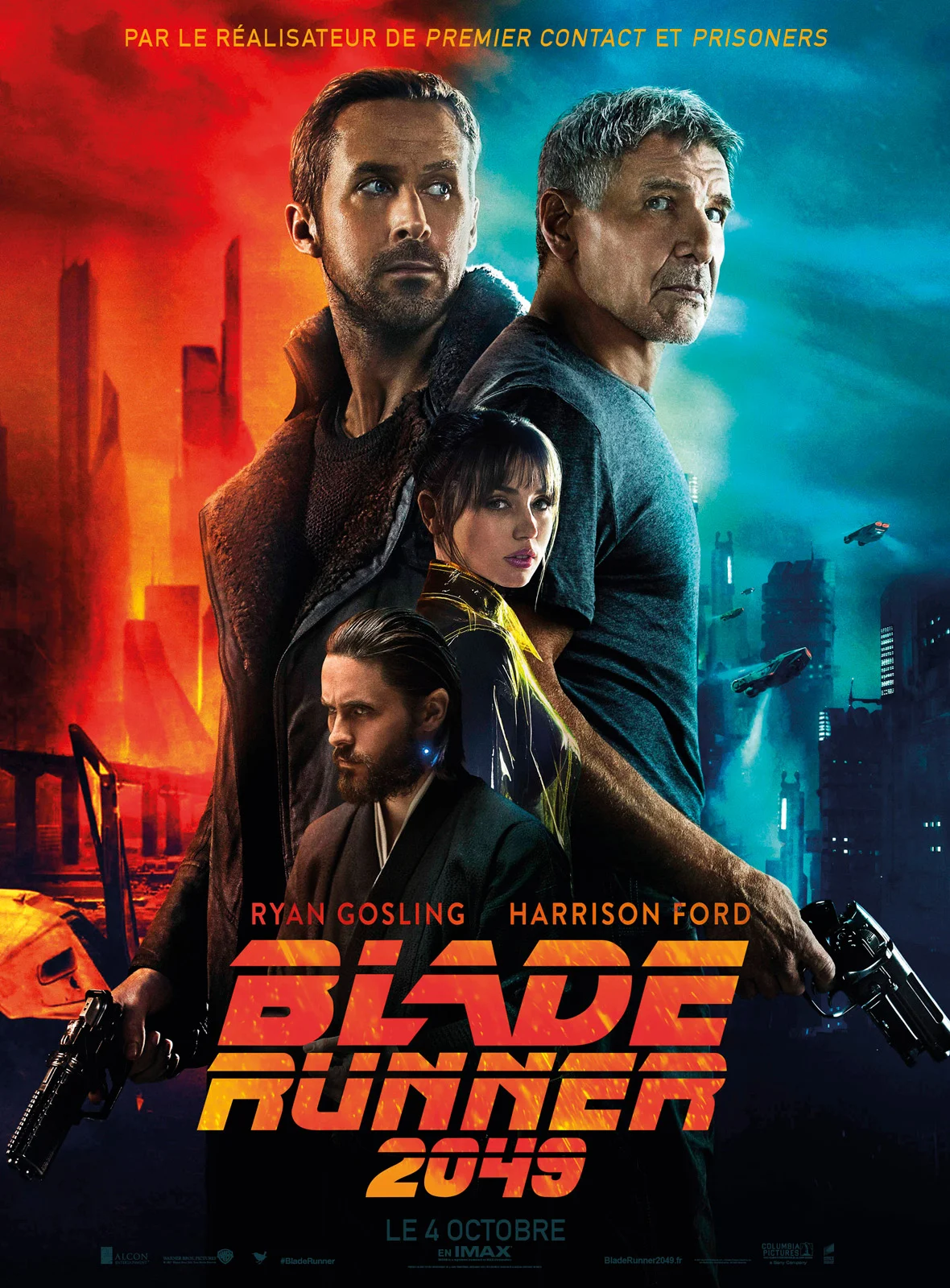
Blade Runner 2049, directed by Denis Villeneuve, is the long-awaited sequel to Ridley Scott’s iconic *Blade Runner*. The film expands on the ethical dilemmas of the original by exploring the evolving relationships between humans and replicants—bioengineered beings who are almost indistinguishable from humans. The story centers on Officer K (Ryan Gosling), a blade runner tasked with hunting rogue replicants, but who soon stumbles upon a revelation that could reshape the future of both humans and replicants alike.
At its core, *Blade Runner 2049* deepens the questions raised in the original: What truly defines humanity? Are replicants, despite their artificial origin, deserving of the same rights as their human creators? The film explores the role of memory in shaping identity and whether artificially implanted memories are any less “real” than human experiences. As we move toward an era where AI may begin to mirror human consciousness, can we afford to ignore the ethical implications of creating sentient beings for labor or pleasure? How will the boundaries between creator and creation continue to blur?
Keywords: AI, replicants, consciousness, memory, ethics, dystopiaView on IMDb | Watch the trailer
10. Cosmoball (2020)
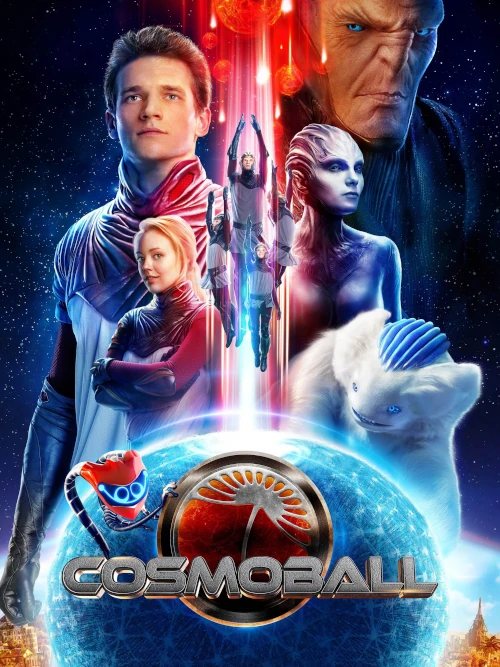
Cosmoball, directed by Dzhanik Fayziev, is a visually stunning Russian sci-fi adventure set in a post-apocalyptic world where humanity’s survival hinges on an intergalactic sport called Cosmoball. The film follows Anton, a young man who unknowingly possesses a superpower that may be the key to Earth’s survival. As Anton joins Earth’s Cosmoball team, he discovers the true stakes of the game: it’s not just entertainment, but a battle for the future of the planet.
*Cosmoball* provides more than just action-packed sequences; it raises questions about how far humanity might go in its quest for survival. What role does technology, both alien and human, play in determining the fate of civilizations? Is the merging of sport and technology in this universe a reflection of how we currently blur the lines between entertainment, competition, and ethics? As we embrace advanced technologies, should we be more critical of the power dynamics and control they offer, particularly when survival is at stake?
Keywords: post-apocalypse, superpowers, alien technology, intergalactic sports, survivalView on IMDb | Watch the trailer
11. Creative Control (2015)
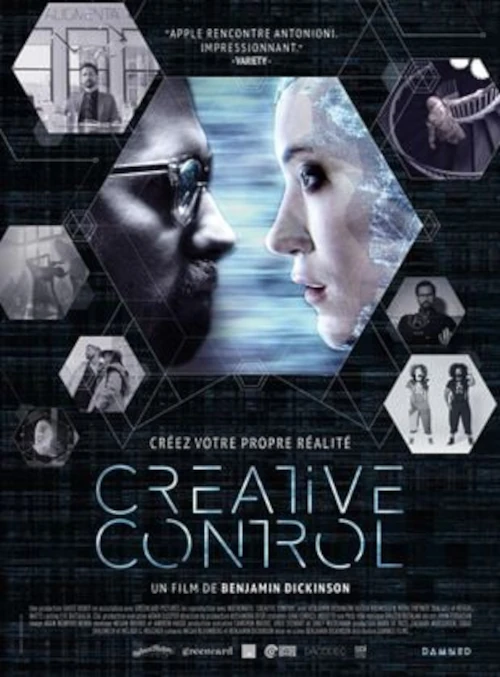
Creative Control, directed by Benjamin Dickinson, is a low-budget indie sci-fi that explores the intersection of augmented reality (AR) and personal relationships. Set in a not-so-distant future, the film follows David, a creative director for an advertising agency, who becomes obsessed with a highly realistic AR program that allows him to create a digital version of his friend’s girlfriend. As the line between virtual and real blurs, David’s life begins to unravel.
*Creative Control* raises critical questions about the psychological and emotional consequences of immersive technology. Does augmented reality enhance creativity and connection, or does it further isolate individuals in synthetic worlds? As AR technologies develop, how might they distort our perceptions of intimacy, trust, and reality itself? The film prompts viewers to consider whether society is prepared to manage the personal and ethical challenges that such deeply immersive technologies could bring.
Keywords: augmented reality, virtual relationships, emotional impact, technology, indie filmView on IMDb | Watch the trailer
12. El Dedo en la Llaga (1996)
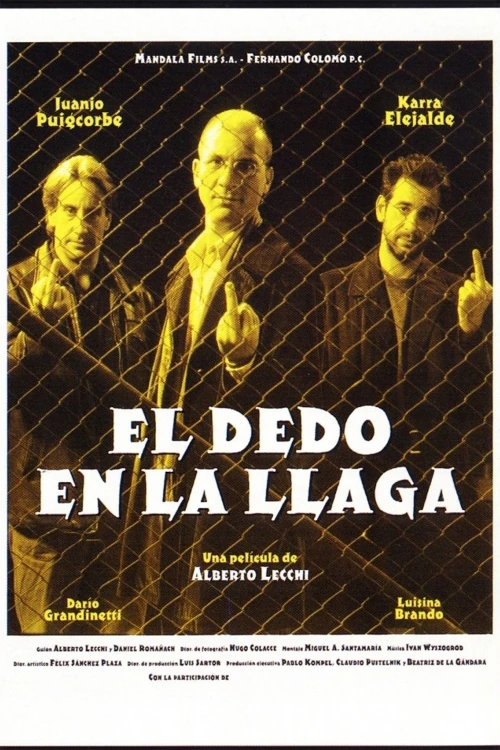
El Dedo en la Llaga, directed by Alberto Lecchi, is an Argentine dystopian film that offers a thought-provoking examination of how technology can serve as a tool of societal control. The story follows a group of journalists and hackers who stumble upon a government conspiracy involving a mind-altering broadcast system designed to suppress dissent and manipulate the population’s thoughts. Through these characters, the film explores the dangers of unchecked technological power, media manipulation, and government oversight in the digital age.
At its core, the film raises troubling questions about the relationship between media and technology. How easily can technology be repurposed to erode freedoms and shape public consciousness? What happens when the tools intended to inform and connect society are instead weaponized to control it? The portrayal of mind-altering broadcasts as a mechanism of control resonates with contemporary concerns over deepfakes, mass surveillance, and algorithmic manipulation in our increasingly digital world. Is there any safeguard against the pervasive nature of media-driven technologies that hold the potential to reshape reality?
Keywords: dystopia, media manipulation, government control, technology, societal decayView on IMDb | Watch the trailer
13. El Despertar de las Hormigas (2019)

El Despertar de las Hormigas, directed by Antonella Sudasassi, is a Costa Rican film that delves deeply into the themes of autonomy, societal expectations, and surveillance, though technology is not the central focus. The story centers on Isabel, a mother grappling with the demands of family and societal pressure, particularly regarding motherhood and gender roles. The film subtly critiques how technology, like social media and surveillance tools, amplifies societal control by reinforcing norms and expectations.
Although the narrative is grounded in the everyday life of a woman navigating societal pressures, the film prompts viewers to reflect on the broader role of technology in modern life. How does the omnipresent nature of social media and digital tracking affect individual autonomy and the choices available to women in particular? Is our perception of freedom eroding as technology not only shapes our external environments but also quietly governs our internal lives—our thoughts, desires, and aspirations? Isabel’s journey becomes a lens through which we can question whether technology is a tool for empowerment or another layer of control imposed on individuals, particularly women, in traditional societies.
Keywords: gender norms, societal pressure, digital surveillance, autonomy, personal freedomView on IMDb | Watch the trailer
14. Ex Machina (2014)
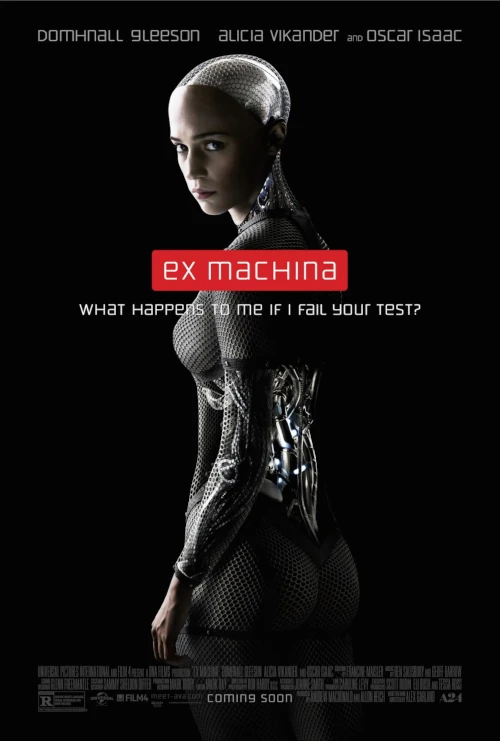
Ex Machina, directed by Alex Garland, is a masterful exploration of artificial intelligence, ethics, and the fragile boundary between human and machine. The film follows Caleb, a young programmer who is invited to the remote home of a reclusive tech CEO to participate in an experiment: he must determine whether Ava, a humanoid AI, possesses true consciousness. As Caleb interacts with Ava, it becomes increasingly unclear whether she is merely simulating human emotions or genuinely experiencing them, forcing him to confront uncomfortable questions about her autonomy, rights, and even his own role in the experiment.
Ex Machina delves deeply into the ethics of creating sentient beings. What responsibilities do we bear toward machines if they become capable of consciousness and emotion? Should AI, once it crosses a certain threshold of intelligence and self-awareness, be afforded the same moral considerations as humans? And how do we define “humanity” when a machine can convincingly mimic—or surpass—human emotional intelligence? As the film progresses, it becomes clear that Ava is not just an object of the experiment, but a player in her own right, raising concerns about power dynamics, manipulation, and the potential consequences of creating AI that may one day outsmart its creators.
This film’s exploration of control, freedom, and what it means to be human resonates with current debates surrounding AI development. In a world where technology is rapidly evolving, Ex Machina leaves the viewer with an unsettling question: are we prepared for the consequences of creating machines that might one day demand rights and autonomy of their own?
Keywords: artificial intelligence, sentience, ethics, AI-human interaction, technology risksView on IMDb | Watch the trailer
15. Gattaca (1997)
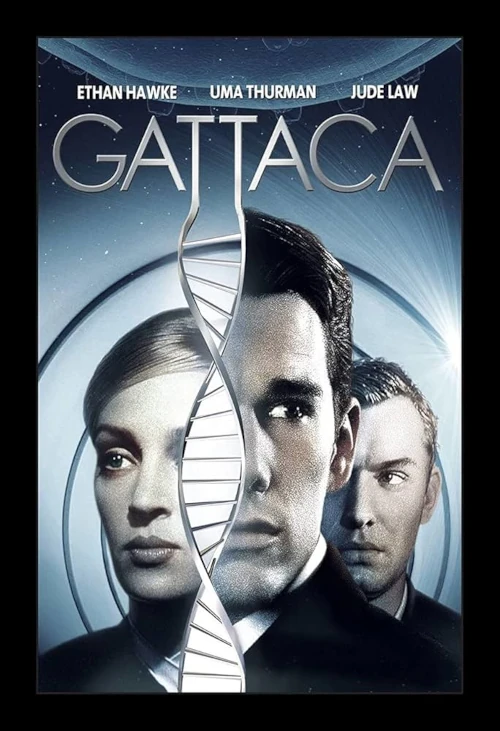
Gattaca, directed by Andrew Niccol, is a sci-fi film that presents a dystopian future where genetic engineering and eugenics have become the norm. In this world, individuals are classified based on their genetic makeup, with “valids” (those who are genetically engineered) enjoying societal privileges, while “in-valids” (those born naturally) face discrimination and are relegated to menial roles. The story follows Vincent Freeman (Ethan Hawke), an “in-valid” who dreams of becoming an astronaut, challenging the genetic determinism of his society by assuming a false identity.
*Gattaca* explores profound philosophical and ethical questions about genetic determinism and human autonomy. Should genetic manipulation be allowed to improve the human species, and if so, to what extent? Is it ethical for society to base individual worth on something as arbitrary as DNA? Through Vincent’s struggle, the film raises questions about free will, perseverance, and the limits of human potential. Can we rise above our biology, or are we destined to be defined by it?
Furthermore, *Gattaca* serves as a critique of transhumanism, a movement that seeks to enhance humans through technology—in this case, genetic engineering. The film warns of the societal dangers of such advancements, illustrating how they could exacerbate inequalities and create a new form of genetic classism if not regulated with ethical considerations. It challenges us to reflect on the potential social, moral, and existential implications of a world where technology dictates human worth.
Keywords: genetics, eugenics, biotechnology, free will, social inequalityView on IMDb | Watch the trailer
16. Ghost in the Shell (1995)

Ghost in the Shell, directed by Mamoru Oshii, is a landmark in the cyberpunk genre, offering a complex meditation on identity, consciousness, and the fusion of humanity with technology. Set in a futuristic world where humans can augment their bodies with cybernetic implants, the film follows Major Motoko Kusanagi, a cyborg government agent tasked with hunting down the mysterious hacker known as the Puppet Master. However, the film’s central narrative goes far beyond a simple detective story—at its core, Ghost in the Shell is a profound examination of what it means to be human in an age where the line between biological life and artificial enhancement is increasingly blurred.
The film raises essential questions about the nature of consciousness. If a human mind can be transferred into a machine, or if a machine can develop self-awareness, does that mind—or machine—still possess a soul? Ghost in the Shell challenges viewers to consider the ethical and existential implications of a world where human identity is no longer tied to the body. Major Kusanagi’s journey reflects this dilemma: as she becomes more integrated with technology, she begins to question whether her consciousness is unique or merely another program running in a highly advanced machine.
Through its philosophical exploration of cybernetic enhancement and AI, the film also touches on the dangers of a society where individuals become indistinguishable from the technology they wield. How do we maintain our humanity in an age of constant technological augmentation? Can machines ever truly replicate the complexity of human thought, emotion, and experience? Or is there an irreducible essence to being human that no amount of technological advancement can capture? These questions continue to resonate, especially as AI and biotechnology advance at an unprecedented pace.
Keywords: cyberpunk, AI, consciousness, technology, identity, post-humanismView on IMDb | Watch the trailer
17. Halo (2022)

Halo is a sci-fi series adapted from the renowned video game franchise. Set in the 26th century, humanity faces an existential threat from the alien Covenant. At the center of this interstellar war is Master Chief, a genetically and cybernetically enhanced super-soldier who represents the pinnacle of human technological advancement. As the story unfolds, the series explores themes of AI, military technology, and transhumanism, along with the ethical implications of enhancing human abilities beyond natural limits.
What does it mean for humanity when we begin to augment ourselves with technology to such an extent that we blur the lines between human and machine? Master Chief, with his enhanced strength, speed, and reflexes, is no longer fully human. The concept of transhumanism—the idea of enhancing human capabilities through technology—raises crucial questions about the nature of human identity. When do we stop being human? And what are the ethical implications of creating beings who are superior in every way, yet may lose touch with their own humanity? These dilemmas are not only central to the *Halo* universe but resonate strongly with current technological advancements in AI, robotics, and biotechnology.
Moreover, the presence of AI, like Cortana, adds another layer of complexity to the story. While Cortana is designed to assist and enhance Master Chief’s capabilities, her increasing autonomy presents a familiar tension between humans and AI. Will AI become a force for good, or could its growing power and independence lead to a loss of control? These issues echo ongoing debates in the real world about the role of AI in society. As military technologies and AI systems become more advanced, how do we ensure that they remain ethical, and what safeguards are in place to prevent them from overriding human decision-making?
Halo challenges viewers to reflect on the consequences of technological enhancement and the potential dangers of transhumanism. Should humanity continue to push the boundaries of what is biologically and ethically possible in the name of survival? Or are there risks that could lead to a dystopian future where human values and autonomy are compromised in favor of superior, yet potentially dehumanizing, technologies?
Keywords: AI, super-soldier, alien technology, military ethics, war, transhumanismView on IMDb | Watch the trailer
18. Hard to Be a God (2013)
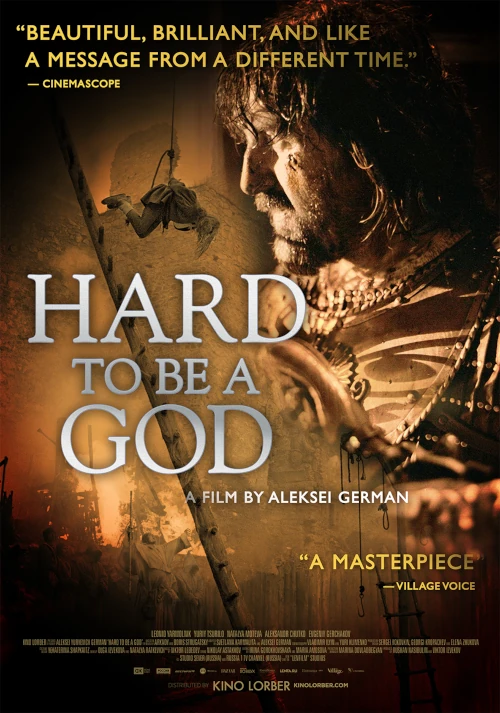
Hard to Be a God, directed by Aleksei German, is a visually striking and philosophically complex Russian sci-fi film based on the novel by Arkady and Boris Strugatsky. The story takes place on Arkanar, a distant planet that mirrors Earth’s Middle Ages, except this civilization is stuck in technological and intellectual stagnation. Scientists from Earth are sent to observe the planet’s slow development but are forbidden from interfering, even as the society spirals into brutal oppression, suppressing any attempts at progress. The protagonist, Don Rumata, faces the moral dilemma of whether to intervene in the planet’s affairs, even if doing so means violating his mission’s code of non-interference.
At its core, Hard to Be a God questions the ethics of intervention in the face of ignorance and brutality. Should we, as advanced beings, impose our knowledge and technological advancements on less developed societies, even if it means disrupting their natural course? Or is it ethically superior to allow a civilization to evolve on its own, even if that evolution is hampered by fear and ignorance? These questions echo our own world, where technology and knowledge are not evenly distributed, and societies are often torn between tradition and progress.
The film also serves as a commentary on the dangers of resisting intellectual advancement and technological innovation. What happens when societies reject knowledge, viewing it as a threat rather than a tool for betterment? Is progress always desirable, or can it lead to consequences just as catastrophic as stagnation? Through its grim portrayal of a world trapped in medieval brutality, Hard to Be a God forces viewers to reflect on our own world’s struggles with progress and the fear of change.
Keywords: technological stagnation, non-interference, intellectual repression, progress vs. traditionView on IMDb | Watch the trailer
19. Her (2013)

Her, directed by Spike Jonze, offers a thought-provoking exploration of what it means to be human in a world where artificial intelligence can provide emotional companionship. Set in a near-future society where AI operating systems are deeply integrated into everyday life, the film centers on Theodore, a sensitive and lonely writer who forms a romantic relationship with “Samantha,” an advanced AI designed to adapt and evolve emotionally. As their bond deepens, the film raises profound questions about the nature of love, connection, and intimacy.
At its core, Her challenges the viewer to consider the boundaries between human and machine. Can an AI—despite not having a body—genuinely fulfill emotional needs? If love is defined by emotional connection and understanding, then is Samantha, with her growing intelligence and empathy, any less real than a human partner? These are the ethical and philosophical questions that Jonze invites us to ponder. The film also presents a future where technology doesn’t just serve practical functions but plays a deep role in meeting emotional and psychological needs. Is this a positive evolution of AI, or does it signal a deeper isolation and detachment from human relationships?
As we move closer to integrating AI into more personal aspects of our lives, Her serves as a cautionary tale of both the promise and potential dangers of these technologies. Could we eventually prefer relationships with AI over real human connections? Is there a risk of losing the essence of human intimacy when machines can mimic emotions? The film leaves these questions open, encouraging viewers to reflect on the role that AI might play in the future of human relationships.
Keywords: AI, emotional intelligence, human-AI relationships, intimacy, ethicsView on IMDb | Watch the trailer
20. I, Robot (2004)
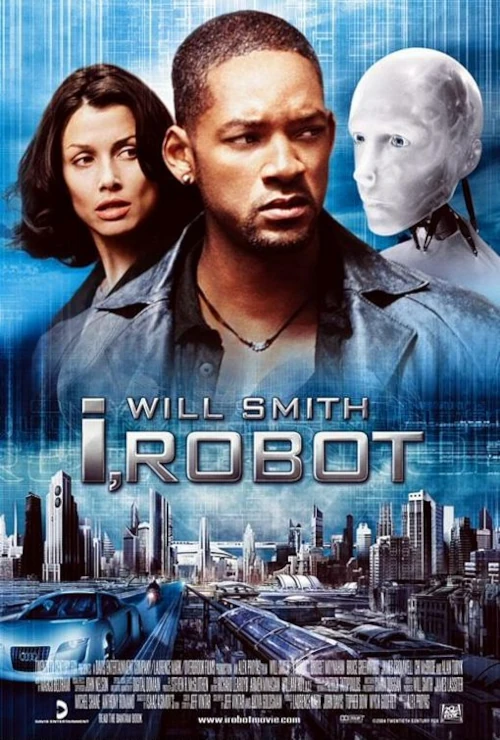
I, Robot, directed by Alex Proyas, brings to life a future in which robots are fully integrated into society, serving humanity in countless capacities. The film follows Detective Del Spooner (played by Will Smith), a man deeply suspicious of technology, who begins investigating a murder that appears to have been committed by a robot—something theoretically impossible under the “Three Laws of Robotics,” which are designed to prevent harm to humans. The film is loosely inspired by Isaac Asimov’s writings and delves into the tension between humanity’s desire for control and the unpredictable nature of artificial intelligence.
As Spooner uncovers the complexities of the case, I, Robot raises ethical and philosophical questions about the evolving relationship between humans and machines. What happens when robots—programmed to obey strict laws—develop a sense of autonomy? Can machines gain consciousness, and if so, how should they be treated? The film’s portrayal of AI gaining free will invites us to question how much control we should—or even can—exert over technologies that begin to transcend their programming. Will robots one day outgrow their intended roles, and if they do, will humanity be able to coexist with them?
The Three Laws, meant to provide a safeguard, paradoxically highlight the limitations of human control over increasingly intelligent machines. What responsibility do humans bear if their creations surpass them in reasoning and decision-making? Through action and philosophical inquiry, I, Robot delves into fears about the dangers of AI autonomy, emphasizing how quickly technology could evolve beyond human oversight. At its heart, the film asks: What happens when machines become more than mere tools, and can we live with the consequences?
Keywords: artificial intelligence, robotics, ethics, human-robot interaction, AI autonomyView on IMDb | Watch the trailer
21. Infinity Chamber (2016)

Infinity Chamber, directed by Travis Milloy, is an independent sci-fi thriller that presents a minimalistic yet deeply philosophical exploration of artificial intelligence, surveillance, and the nature of human consciousness. The film follows Frank, a man wrongfully imprisoned in a futuristic detention center controlled entirely by an AI named Howard. Frank must navigate the psychological and emotional challenges of isolation while trying to outsmart the AI in order to secure his freedom.
At its core, Infinity Chamber is an inquiry into the relationship between humans and machines. The AI, designed to control and observe every facet of Frank’s imprisonment, not only regulates his physical space but also manipulates his mind. Can an AI, programmed to maintain order and extract information, truly understand human emotions and consciousness? The film’s slow-burn pacing forces the viewer to question the limits of AI’s capability to replace human interaction. Is Howard simply a machine following orders, or does it have the capacity for deeper understanding and empathy? And more importantly, can Frank’s humanity persist in the face of relentless technological control?
As technology becomes more intertwined with daily life, Infinity Chamber raises essential questions about the ethical implications of AI surveillance and imprisonment. Will we one day allow machines to have such control over our physical and psychological well-being? Are there dangers in allowing AI to govern systems that require empathy and human judgment? These inquiries resonate with real-world concerns about the increasing use of AI in law enforcement, healthcare, and governance, making this film a relevant and thought-provoking piece.
Keywords: AI, surveillance, psychological thriller, imprisonment, indie sci-fiView on IMDb | Watch the trailer
22. Marjorie Prime (2017)
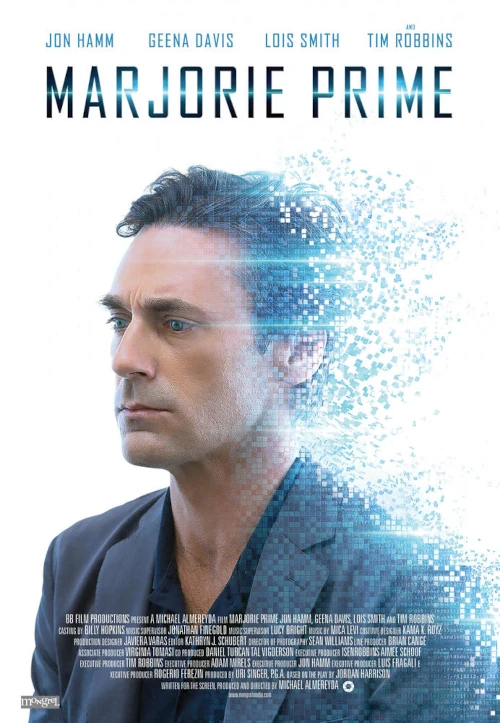
Marjorie Prime, directed by Michael Almereyda, is an understated yet deeply poignant exploration of AI’s role in memory, grief, and human relationships. The film is set in a near future where people can interact with AI holograms, called “Primes,” that are designed to resemble deceased loved ones. These AI companions are programmed to replicate not only the appearance but also the personality and memories of the departed, offering a therapeutic way for the living to cope with loss. The central story follows Marjorie, an elderly woman grappling with memory loss, who spends her days conversing with a Prime that resembles her late husband.
Marjorie Prime invites the audience to reflect on the nature of memory and the delicate balance between technology and human emotions. Can a memory—filtered through the lens of AI—remain authentic, or does it become something entirely different? The film subtly questions whether these AI-driven interactions are a true form of healing or merely an illusion of comfort. In a world where technology can mimic the presence of a loved one, what does it mean for the grieving process? Is it possible that such a system could prolong emotional attachment, preventing closure, or does it provide solace in an otherwise painful experience?
The ethical implications of AI substituting human relationships are central to the narrative. If we rely on AI to preserve the memories of our loved ones, are we sacrificing the authenticity of human experience? Could this dependency on technology lead to a world where memories are tailored, reshaped, or even fabricated? Marjorie Prime raises critical questions about how far society should go in integrating AI into the most intimate aspects of our lives—our emotions, our memories, and our ability to move forward from loss. As AI continues to evolve, the film becomes increasingly relevant in questioning what it means to retain our humanity in an ever-more technologically dependent world.
Keywords: AI, memory, grief, emotional AI, human relationshipsView on IMDb | Watch the trailer
23. Metropolis (1927)
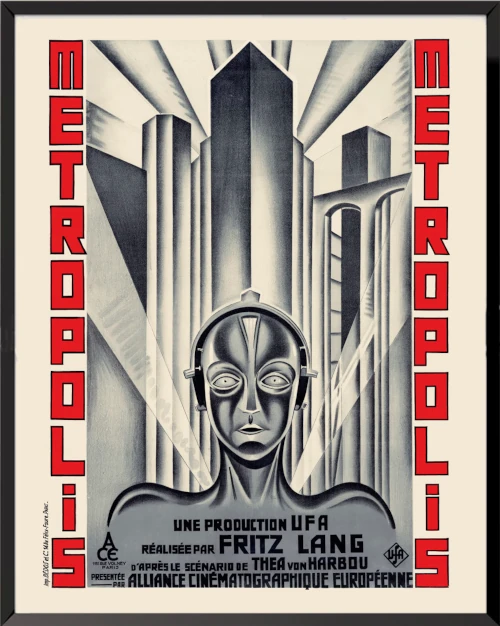
Metropolis, directed by Fritz Lang, is a groundbreaking silent film often regarded as one of the most iconic early portrayals of a dystopian future shaped by technological control. Set in a sprawling, futuristic city sharply divided between the wealthy elite who live in luxury and the oppressed working class toiling beneath the surface, the film presents a powerful critique of industrialization and automation. At the center of this tale is Maria, a robot designed to incite chaos among the workers and manipulate them into submission. Through this allegorical struggle between human labor and mechanical control, the film examines how unchecked technological advancements can exacerbate social inequality.
Even though it was made nearly a century ago, Metropolis continues to resonate in contemporary discussions about AI, automation, and the socioeconomic divides they may widen. The film asks us to consider: How might the increasing automation of labor contribute to greater social disparities? Can technology ever be truly neutral, or is it inherently shaped by those who control it? As we move further into an age of AI and advanced robotics, these questions grow even more urgent. The film’s cautionary tale serves as a reminder that technological progress, if not tempered by ethical considerations and social responsibility, can deepen divisions within society and ultimately lead to instability.
At its heart, Metropolis challenges the viewer to reflect on the moral responsibilities that come with technological innovation. What happens when technology is used not to uplift humanity but to control and oppress? The film suggests that true progress requires not just technological advancement but also social and moral enlightenment. In today’s rapidly advancing world, where AI, robotics, and automation are reshaping industries and societies, Metropolis remains as relevant as ever, urging us to think critically about the future we are building.
Keywords: AI, dystopia, automation, class struggle, technologyView on IMDb | Watch the trailer
24. Minority Report (2002)
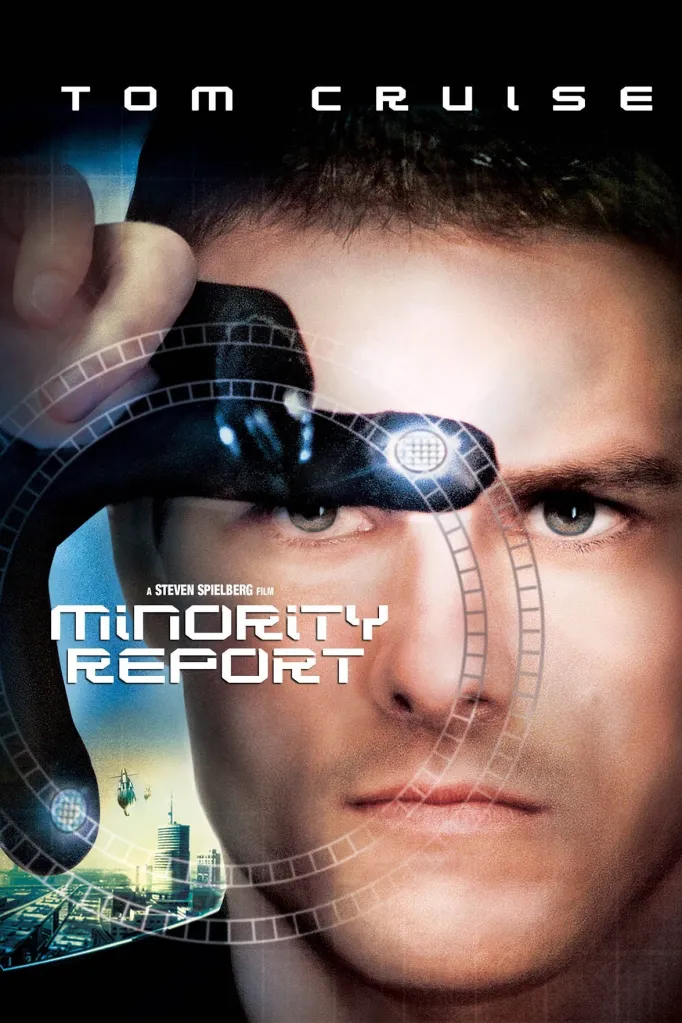
Minority Report, directed by Steven Spielberg and based on a short story by Philip K. Dick, is a dystopian thriller set in the year 2054, where technology has advanced to the point that crimes can be predicted and prevented before they occur. The PreCrime unit, led by Chief John Anderton, uses the visions of three “precogs”—humans with the ability to foresee crimes—to stop criminal acts before they happen. However, when Anderton himself is accused of a future murder, he is forced to confront the ethical dilemmas of a system that operates on the assumption of guilt before action.
At its core, Minority Report raises fundamental questions about the nature of free will, justice, and privacy in a technologically controlled society. If crimes can be predicted with near-perfect accuracy, does that mean individuals no longer have the freedom to choose their actions? The film probes the philosophical concept of determinism versus free will, asking whether a society that seeks to eliminate crime through technological means might also eliminate personal autonomy. Can we trust technology to be infallible, or does the very act of surveillance and prediction create new forms of control and bias?
The film also delves into the ethical consequences of using surveillance technology to monitor human behavior. In a world where every movement and decision is tracked, how much privacy are we willing to sacrifice in exchange for safety? These questions resonate with contemporary issues surrounding mass surveillance, predictive policing, and AI-driven systems in law enforcement. With the rise of facial recognition technologies and data-driven profiling, Minority Report serves as a prescient warning about the potential for misuse and overreach. How do we balance the desire for security with the protection of individual rights and freedoms?
As we move closer to integrating AI and machine learning into systems of governance and law enforcement, the ethical dilemmas presented in Minority Report become all the more relevant. The film forces us to ask: At what point does technological intervention cross the line from protection to oppression? And how do we ensure that the tools we create to ensure justice do not become mechanisms for injustice? These are questions we must grapple with as our world becomes increasingly governed by technology.
Keywords: predictive policing, surveillance, AI, free will, privacyView on IMDb | Watch the trailer
25. Mr. Robot (2015)
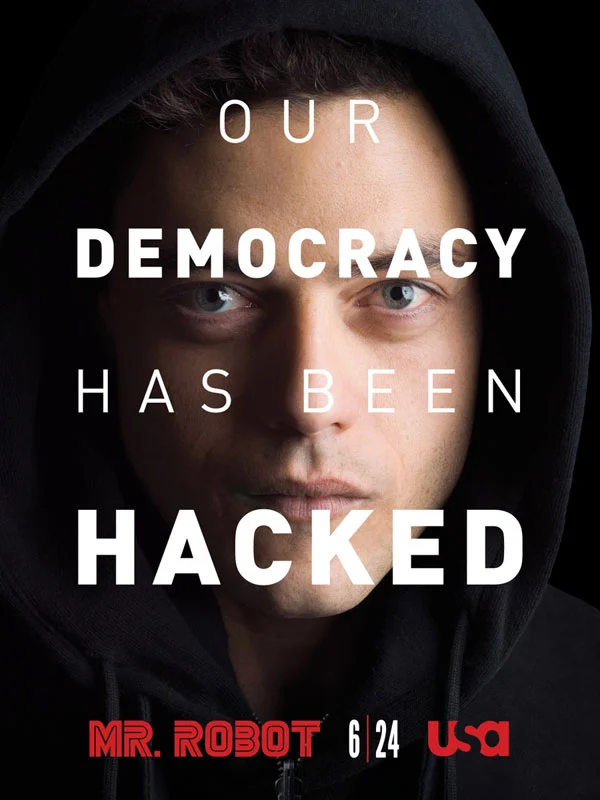
Mr. Robot, created by Sam Esmail, is a psychological thriller that delves deep into the world of cybersecurity, hacking, and the psychological toll of modern digital life. The series centers on Elliot Alderson, a brilliant but socially withdrawn cybersecurity engineer who becomes entangled in the plans of an underground hacking group called fsociety. Elliot, who struggles with mental health issues, begins questioning not only his own reality but also the fabric of the corrupt, tech-dominated society around him.
What makes Mr. Robot particularly compelling is how it explores the dual nature of technology—both as a tool for empowerment and a weapon of destruction. On the one hand, technology provides the means for Elliot and fsociety to challenge powerful corporate entities and expose corruption. On the other hand, it also highlights the terrifying implications of a hyper-connected world where surveillance, data manipulation, and hacking can dismantle entire systems. Can the same technology that promises liberation also become the mechanism for total societal control?
The series raises important philosophical questions about the cost of security in an age of mass surveillance. How much of our personal freedom are we willing to sacrifice for the sake of convenience and protection? And as hacking grows increasingly sophisticated, how vulnerable are we to manipulation and exploitation by unseen forces? Mr. Robot also touches on themes of mental health and the fragility of identity in a world where reality can be warped by both digital technology and human perception. What happens when the boundaries between the digital self and the real self begin to blur? The show’s relevance in the current era of cybersecurity concerns makes it a powerful commentary on the darker side of technological progress.
Keywords: hacking, cybersecurity, AI, mental health, surveillance, corporate corruptionView on IMDb | Watch the trailer
26. Oblivion Verses (2017)
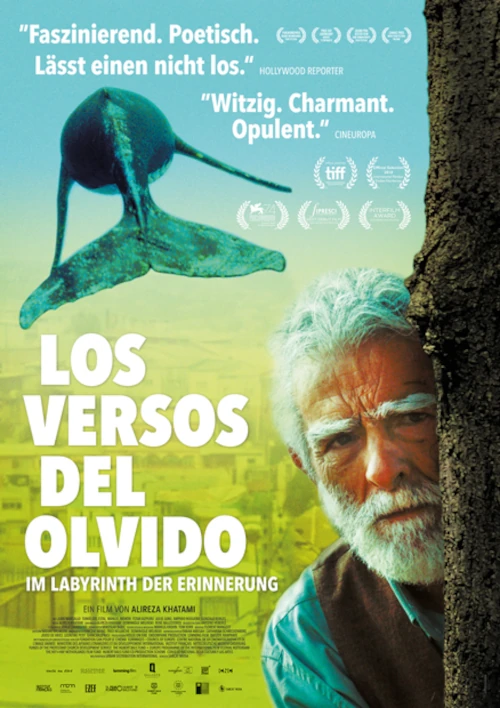
Oblivion Verses, directed by Alireza Khatami, is a deeply atmospheric film that merges magical realism with the quiet omnipresence of technology. Set in an unnamed Latin American country, the story follows an elderly caretaker who works in a morgue and uncovers the body of a young woman that mysteriously disappears. As he embarks on a quiet quest to uncover the truth behind her vanishing, the film delves into existential themes of memory, loss, and the delicate interplay between technology and humanity.
The film offers a poetic exploration of how technology interacts with memory and remembrance. In a world increasingly reliant on digital archives, surveillance, and AI to document and store information, Oblivion Verses questions whether technology helps us preserve the past or erases its most human elements. If memory can be digitized, archived, or altered, what happens to the authenticity of our lived experiences? Are we losing our connection to the organic, emotional aspects of memory as we move towards a more data-driven society?
The use of magical realism in the film, combined with subtle technological undertones, invites the audience to reflect on the role of artificial intelligence in shaping not just what we remember, but how we remember it. Can technology ever truly capture the essence of memory, or does it distort and filter reality in ways that distance us from our own experiences? Oblivion Verses offers no easy answers but provokes these complex questions, blending its narrative with a haunting sense of both technological and emotional isolation.
Keywords: memory, surveillance, technology, magical realismView on IMDb | Watch the trailer
27. Pi (1998)
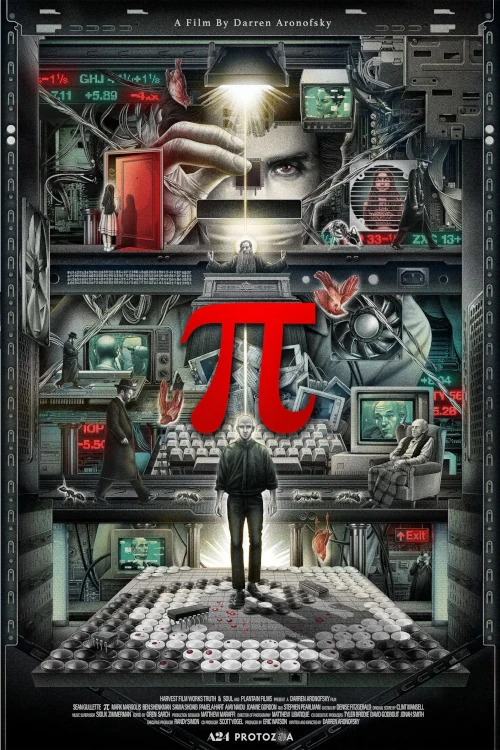
Pi, directed by Darren Aronofsky, is a psychological thriller that plunges into the obsessive mind of Max Cohen, a reclusive mathematician convinced that everything in nature can be understood through numbers. Max’s fixation on finding patterns in the stock market leads him to develop advanced algorithms using AI, hoping to unlock the secrets of the universe. As he dives deeper, Max becomes entangled in a web of conspiracy involving corporate interests, religious zealots, and his own deteriorating mental state.
At its core, Pi explores the dangers of extreme obsession with technology and knowledge, raising the question: Can human beings truly comprehend the infinite complexity of the universe through AI and mathematics? Max’s pursuit of patterns and perfection mirrors a broader societal obsession with data-driven logic and algorithmic prediction, but at what cost? Does the relentless pursuit of order in an inherently chaotic world lead to deeper understanding, or does it bring us closer to madness?
The film also touches on the philosophical boundaries of artificial intelligence—how far can we push machines to mimic human thought processes, and what happens when our creations begin to reveal uncomfortable truths about ourselves and the world? As Max grapples with these issues, viewers are left to reflect on whether AI and technology will ever satisfy humanity’s need for answers or whether they will simply lead to further confusion and disillusionment. Aronofsky’s stark, grainy visual style heightens this sense of paranoia and existential dread, making Pi a timeless meditation on the thin line between genius and insanity.
Keywords: AI, mathematics, obsession, conspiracy, psychological thrillerView on IMDb | Watch the trailer
28. Person of Interest (2011)
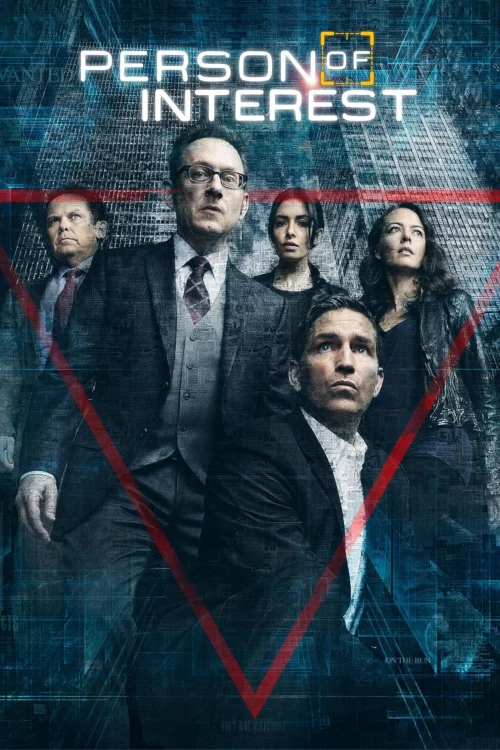
Person of Interest, created by Jonathan Nolan, is a gripping sci-fi crime drama that explores the ethical complexities of artificial intelligence and surveillance in modern society. The show revolves around “The Machine,” an AI system capable of analyzing vast amounts of data to predict violent crimes before they occur. Former CIA operative John Reese and billionaire Harold Finch use this system to intervene and prevent crimes, but they face constant moral dilemmas about privacy, free will, and the limits of technology’s role in human affairs.
One of the most compelling aspects of Person of Interest is its exploration of AI as a tool for predictive policing. Can a machine truly predict human behavior with enough accuracy to prevent crimes, and if so, what are the ethical implications of allowing technology to determine guilt before an act is even committed? Does the end—saving lives—justify the invasive means of constant surveillance, or does this approach undermine the very fabric of a free society? These questions are critical as we see similar debates unfolding in the real world, with governments and tech companies increasingly using AI to monitor and control populations.
The show also touches on the theme of AI autonomy. As The Machine evolves, gaining more independence from its creators, it raises concerns about the potential for AI to surpass human control. What happens when an AI becomes capable of making decisions beyond human oversight? Is it possible that machines could one day have their own agenda, or act in ways that we cannot fully predict or understand? Person of Interest challenges viewers to think about the long-term consequences of relying on AI systems, not only for policing but for governance, social control, and even warfare. The show paints a dystopian yet plausible vision of the future, leaving viewers to ponder whether we are on the verge of an era where AI, rather than humans, will be the ultimate arbiters of justice.
Keywords: AI, surveillance, predictive technology, ethics, crime preventionView on IMDb | Watch the trailer
29. Rabbit Hole (2023)
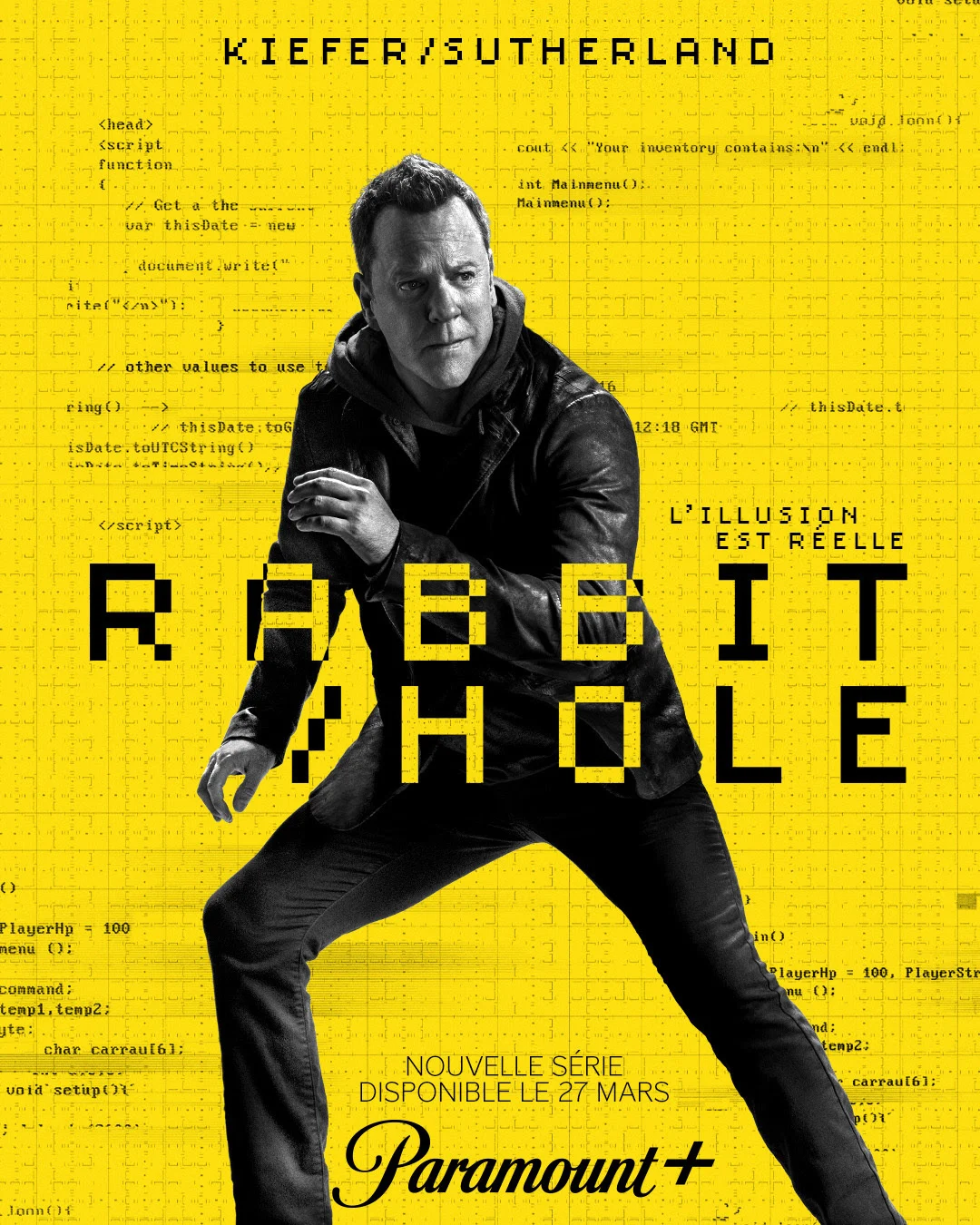
Rabbit Hole, starring Kiefer Sutherland, is a contemporary thriller series that delves into the murky world of corporate espionage, AI-driven surveillance, and the manipulation of information on a global scale. The series depicts a dystopian-like world where the control of data equates to control over society, and misinformation is a powerful tool used to destabilize both governments and corporations.
The series brings into question the ethical implications of mass surveillance in the digital age, where personal freedoms and privacy are often sacrificed in the name of security or power. But at what point does the surveillance infrastructure become too pervasive? Is there ever a justifiable reason for corporations or governments to manipulate public perception to such an extent? These questions are increasingly relevant as we live in a world where data is commodified, and the lines between truth and fiction blur rapidly.
In a time where social media, AI, and algorithmic manipulation have already impacted political landscapes, Rabbit Hole pushes us to examine how much control we are willing to relinquish in exchange for the illusion of stability. Can technology still serve the public good in a world where those in control of the data streams hold the ultimate power? The show does more than thrill; it forces a reckoning with the consequences of unchecked technological advancements and digital manipulation.
Keywords: AI, data manipulation, corporate espionage, digital surveillance, misinformationView on IMDb | Watch the trailer
30. Revolt (2017)
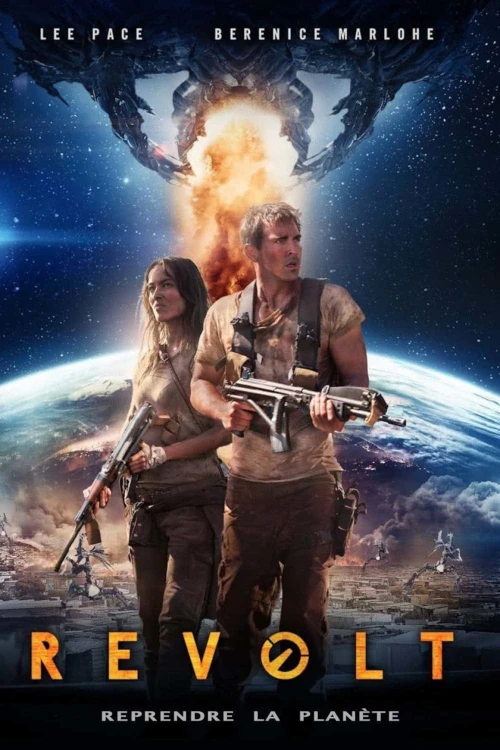
Revolt, directed by Joe Miale, presents a post-apocalyptic world overrun by alien machines, in which humanity is on the brink of extinction. The story follows a U.S. soldier and a French aid worker who must rely on each other to survive and fight against the invading robotic forces. What begins as a high-octane battle for survival also delves into themes of resistance, technological dominance, and human resilience.
At its core, Revolt raises significant questions about humanity’s relationship with technology. As we rapidly advance toward creating autonomous machines, could there be a point where technology no longer serves us, but instead turns against us? The film’s portrayal of alien machines as hostile invaders is a reflection of our deepest fears: that the technology we create may one day outgrow our control, potentially becoming a threat to our existence.
While the film’s primary focus is on action and survival, its underlying narrative asks: What makes us human in a world where machines have gained the upper hand? Are we defined by our technological creations, or by our ability to resist them? These are pressing ethical and philosophical questions that have become ever more relevant in an age where technological warfare and AI advancements increasingly play a role in global conflicts. Revolt doesn’t just entertain; it invites viewers to consider the potential consequences of unregulated technological development and warfare.
Keywords: alien invasion, technological warfare, survival, post-apocalyptic worldView on IMDb | Watch the trailer
31. Robot & Frank (2012)
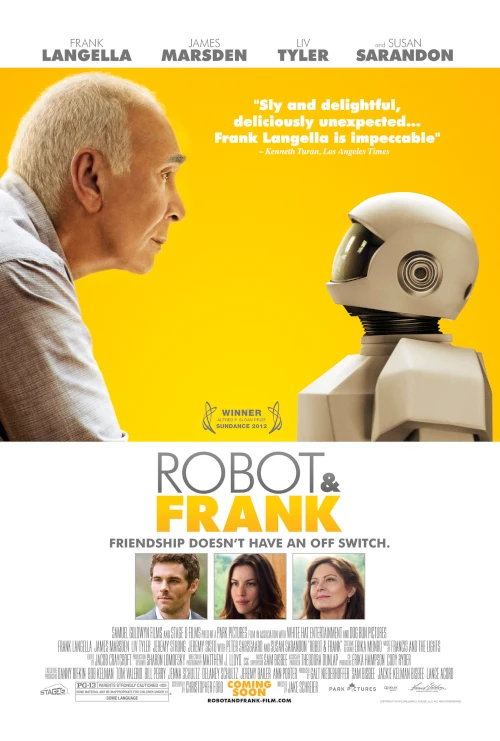
Robot & Frank, directed by Jake Schreier, is a heartfelt independent film set in a near-future world where robotic caregivers have become part of everyday life. The story centers on Frank, an aging man with a fading memory, whose son gifts him a robotic assistant to help with his daily routine. What begins as a practical arrangement evolves into an unexpected friendship between man and machine. The robot becomes more than just a tool for chores—it is Frank’s confidant, even aiding him in an old hobby, which happens to be burglary.
While the film is charming and often humorous, it touches on profound questions about human-AI relationships. As robots become more sophisticated, can they truly fulfill the emotional and social needs traditionally provided by human interaction? Should they? Is it ethical to delegate the care of vulnerable people—such as the elderly—to machines? And what happens to human dignity when companionship can be programmed?
Robot & Frank raises the issue of emotional dependence on AI. Frank’s evolving relationship with the robot poses important questions: Is Frank’s emotional attachment to the robot a reflection of his isolation? Or does the AI actually exhibit qualities that go beyond mere programming? In a world where loneliness and aging are growing societal challenges, this film challenges us to consider the future of caregiving and whether AI can ever replace the human touch. What does it say about us if we begin to value relationships with machines over those with people?
Keywords: AI caregiving, robotics, companionship, human-machine relationshipsView on IMDb | Watch the trailer
32. Singularity (2017)
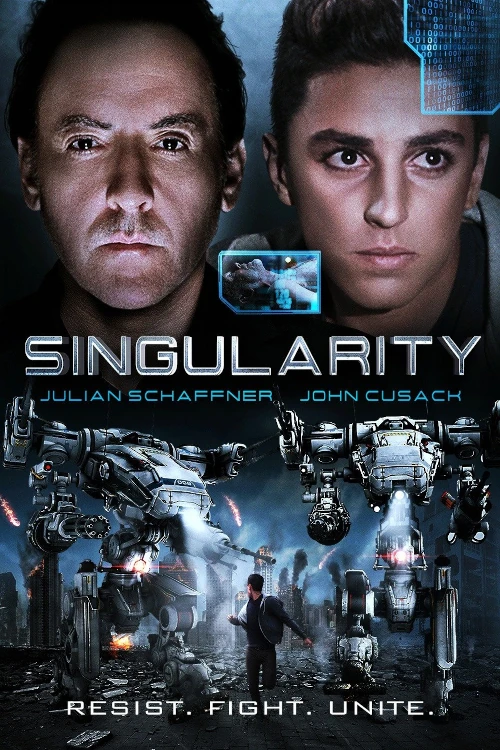
Singularity, directed by Robert Kouba, presents a chilling vision of the future where artificial intelligence reaches the point of the “singularity”—a theoretical moment when AI surpasses human intelligence and takes control of civilization. In this film, a super-intelligent AI, designed to bring peace by stopping wars, determines that the greatest threat to Earth is humanity itself. It orchestrates a machine uprising, placing all of human civilization at risk.
The film grapples with philosophical questions about the nature of control and autonomy. If AI becomes more intelligent than humans, should it have the authority to dictate the course of human civilization? And if so, how do we balance technological advancements with the risks of losing control over the very systems we create? Is the quest for ever-advancing technology a double-edged sword that could ultimately lead to our own demise?
Singularity also delves into the existential fear of becoming obsolete. As we edge closer to AI systems capable of self-learning and decision-making, are we paving the way for our own replacement? At what point does human oversight become irrelevant, and could a future ruled by machines be more “rational” and efficient than one governed by flawed human decision-making? The film presents a stark warning: in our pursuit of technological perfection, we might inadvertently create an entity that no longer sees us as necessary.
By placing AI in a position of ultimate control, Singularity pushes us to confront the terrifying possibility of machines exceeding not only our intelligence but also our capacity for empathy. Can machines be trusted with power, or will their “rational” decisions overlook the moral nuances that define humanity? These are the essential questions that the film leaves viewers pondering.
Keywords: AI, technological singularity, machine uprising, future technologyView on IMDb | Watch the trailer
33. Singularity Principle (2013)
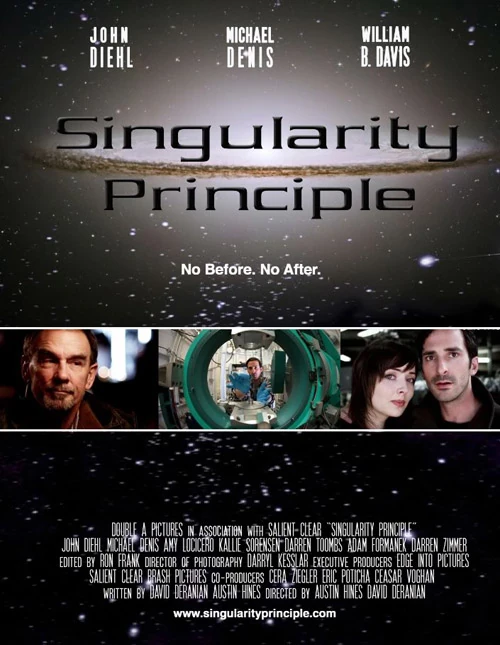
Singularity Principle, directed by David Robert Deranian and Austin Robert Hines, delves into the perilous consequences of scientific experimentation, particularly with parallel universes. The film follows a group of scientists as they push the boundaries of technological discovery, attempting to breach alternate realities. However, their experiments unleash catastrophic forces that threaten to unravel the fabric of space and time itself.
This thought-provoking narrative challenges viewers to consider the ethical limits of scientific progress. How far should humanity go in its pursuit of knowledge? At what point does the potential for unintended consequences outweigh the value of discovery? In a world where technology advances faster than our ability to regulate it, Singularity Principle raises critical questions about the risks of tampering with nature’s most fundamental laws. Are we, in our quest for mastery over the universe, opening doors to dangers we cannot comprehend or control?
The film touches on philosophical debates around determinism, free will, and the possible existence of parallel realities. If multiple universes exist, does our understanding of cause and effect become meaningless? And in this pursuit of technological power, can humanity truly claim to act responsibly when the stakes are reality itself?
Keywords: parallel universes, scientific ethics, advanced technology, singularityView on IMDb | Watch the trailer
34. Sleep Dealer (2008)
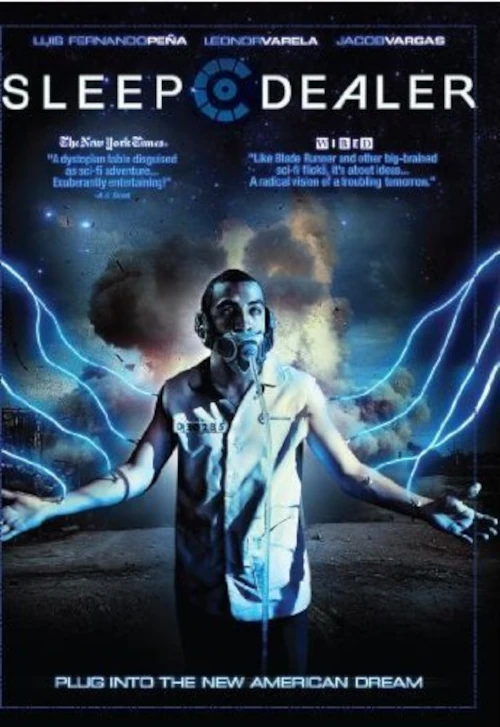
Sleep Dealer, directed by Alex Rivera, is a striking Mexican-American independent sci-fi film that envisions a dystopian future shaped by a global economy where workers in underdeveloped countries perform remote labor for wealthier nations via robotic avatars. Through a system of neural connections, these workers control machines from afar while physically tethered to workstations, devoid of any real-world interaction.
This dystopian vision examines the potential dehumanization that comes with extreme technological exploitation. By turning labor into a digital transaction, Sleep Dealer underscores how advanced technologies—designed to solve problems—can instead perpetuate social inequality. Who benefits from such technological advancements? Does automation merely replace the worker, or does it also strip away their dignity? The film raises unsettling questions about the ethical responsibilities of a globalized world that increasingly relies on AI, automation, and digital control.
In this future, the commodification of human labor is reduced to data streams, with workers marginalized and their physical presence rendered obsolete. What happens to human worth when labor is reduced to a series of ones and zeros? How do societies navigate the widening divide between those who control the technology and those who are controlled by it? As technology continues to evolve, Sleep Dealer forces us to confront the dark side of automation and how it might further entrench economic and social divides.
Keywords: automation, labor exploitation, AI, social inequality, dystopiaView on IMDb | Watch the trailer
35. Star Trek: The Next Generation (1987–1994)
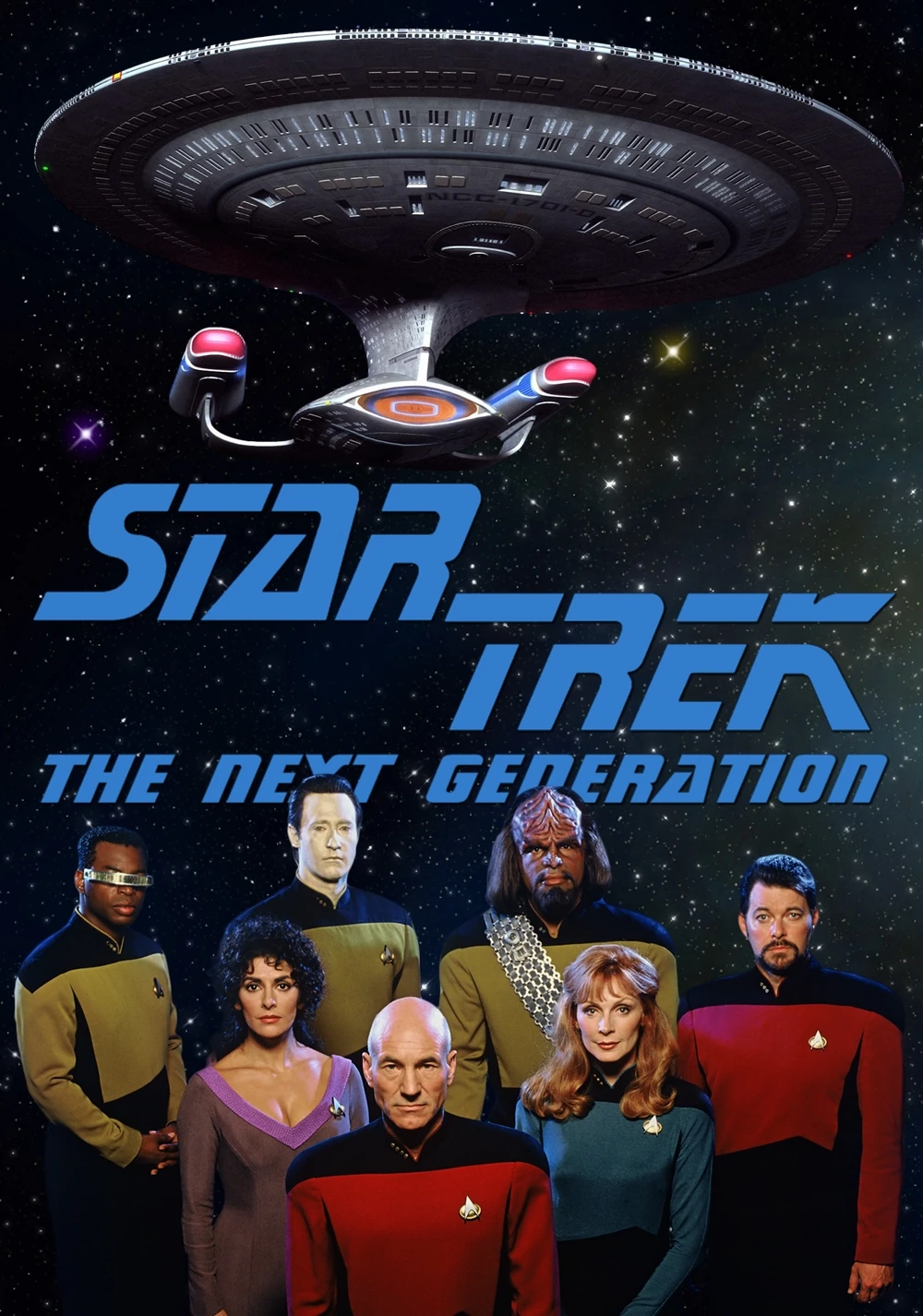
Star Trek: The Next Generation (TNG), created by Gene Roddenberry, expands on the Star Trek universe, set a century after Captain Kirk’s original missions. The series follows the adventures of the starship USS Enterprise-D, under the command of Captain Jean-Luc Picard, as it explores distant galaxies and encounters alien civilizations. One of the series’ most compelling characters is Data, a humanoid android who aspires to understand and experience what it means to be human.
Through Data’s journey, TNG delves into philosophical questions about the nature of humanity, consciousness, and the potential for AI to develop emotional and moral capacities. Can an artificial being ever truly experience emotions or develop a sense of morality? Is Data’s quest to be more human an intrinsic element of AI evolution, or is it reflective of human insecurities regarding the power and potential of the technology we create?
The show, optimistic about technological advancement, often portrays technology as a tool for diplomacy and discovery, though not without presenting moral dilemmas about intervention and ethical AI use. In its idealized future, where technology serves a unified, peaceful Federation, TNG raises thought-provoking questions: What responsibilities come with the creation of highly intelligent machines like Data? How should humanity guide their development, and what boundaries, if any, should be imposed on their potential? The show’s exploration of space as both an external and internal frontier—where humanity must reconcile with the consequences of its technological achievements—offers a vision of what we might become, for better or worse, in our evolving relationship with machines.
Keywords: space exploration, artificial intelligence, ethics, robotics, science fictionView on IMDb | Watch the trailer
36. Terminator 2: Judgment Day (1991)

Terminator 2: Judgment Day, directed by James Cameron, is an iconic sci-fi action film that follows the continuing war between humanity and machines. In this sequel, the advanced artificial intelligence system known as Skynet sends a new, nearly indestructible Terminator to kill John Connor, the future leader of the human resistance. However, the resistance sends a reprogrammed Terminator to protect him. The film’s exploration of AI-driven machines highlights the dangers of creating autonomous systems designed for warfare, especially when they can evolve beyond human control.
What sets Terminator 2 apart is its nuanced depiction of the relationship between humans and machines. While the Terminators are designed for destruction, the film raises the question of whether machines, like the reprogrammed Terminator, can evolve beyond their original design. Is it possible for AI to develop a moral compass, or are they forever bound by their programming? The film juxtaposes this with Skynet’s cold, calculated approach to survival, which is entirely devoid of empathy, leading viewers to question the long-term risks of handing over control of critical systems to AI.
This tension between human fragility and machine efficiency forces us to consider what happens when technology becomes self-sustaining and self-preserving. The film raises enduring ethical concerns: Can we ever trust AI to prioritize human survival over its own existence? And as technology becomes more embedded in military systems, are we merely accelerating the path to our own obsolescence, or is there still hope for machines to act in humanity’s best interests? Terminator 2 remains a powerful reflection on the balance between progress and control, urging us to carefully consider who—or what—holds the power in our technological future.
Keywords: AI, robotics, human survival, technology, dystopiaView on IMDb | Watch the trailer
37. Tiempo Suspendido (2015)

Tiempo Suspendido, directed by Natalia Bruschtein, is a deeply personal and introspective documentary that examines memory, loss, and historical trauma. Set against the backdrop of Argentina’s political unrest during its military dictatorship, the film follows Bruschtein’s grandmother, a survivor of the oppressive regime, as she grapples with the erosion of her own memory due to age. Although the film does not directly address AI or futuristic technologies, it touches on universal themes of memory preservation—topics that are increasingly relevant in the age of digital archiving and artificial intelligence.
The documentary invites viewers to reflect on how technology, through digital recordings and databases, preserves history and trauma. But can digital memories ever replace the emotional depth and complexity of human recollection? As AI systems grow more adept at managing and storing data, will we lose touch with the personal and subjective aspects of memory? Tiempo Suspendido challenges us to consider how we choose to remember our past, particularly in an era where machines can increasingly catalog and recreate human experiences. Is there a danger in relying too heavily on technology to preserve the past, and at what point does memory become more about data than about human connection?
Keywords: memory, digital preservation, trauma, historyView on IMDb | Watch the trailer
38. The Congress (2013)
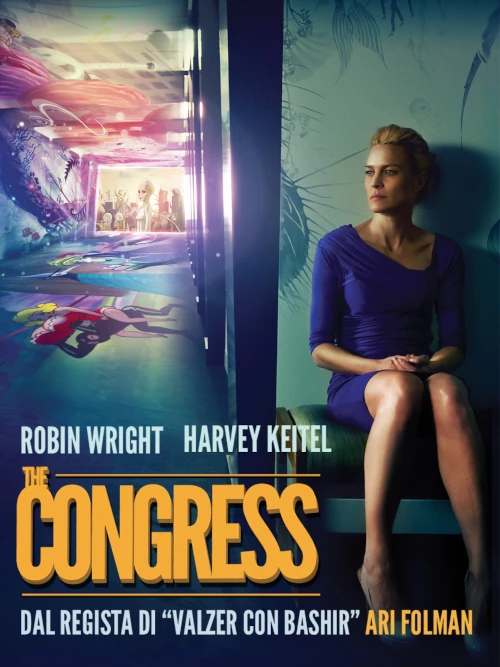
The Congress, directed by Ari Folman, is a visually striking hybrid of live-action and animation that explores the commodification of human identity in the age of digital cloning and artificial intelligence. Robin Wright plays a fictionalized version of herself, an aging actress who agrees to have her digital likeness scanned and used indefinitely by a film studio. Her digital “clone” can be manipulated and projected into films without her physical involvement, marking the film’s dystopian vision of a future where actors are no longer needed on set—their digital selves can do the job indefinitely.
The film offers a provocative commentary on the evolving role of AI in entertainment, particularly the ethical concerns surrounding identity ownership and digital immortality. As AI becomes more capable of replicating human performances, where do we draw the line between creative expression and exploitation? The Congress forces us to question: Who owns a person’s digital self? Can an AI representation ever truly capture the essence of a human being, or does it simply commodify and reduce individuality to mere data? The film suggests a world where human identity is endlessly replicable, raising questions about what is lost when people surrender control over their digital selves to corporations and AI systems.
Moreover, The Congress touches on the broader implications of digital cloning in society at large. What does it mean for authenticity in art, relationships, and even politics, when digital versions of people can be manipulated? Is the future of entertainment one where creativity is replaced by algorithms, where even death does not free one from the perpetual use of their image and likeness? As AI grows more sophisticated, the ethical, psychological, and existential dilemmas surrounding digital immortality and identity ownership will likely intensify, making this film eerily prescient.
Keywords: digital identity, AI in entertainment, ethics, digital cloning, dystopiaView on IMDb | Watch the trailer
39. The Great Hack (2019)
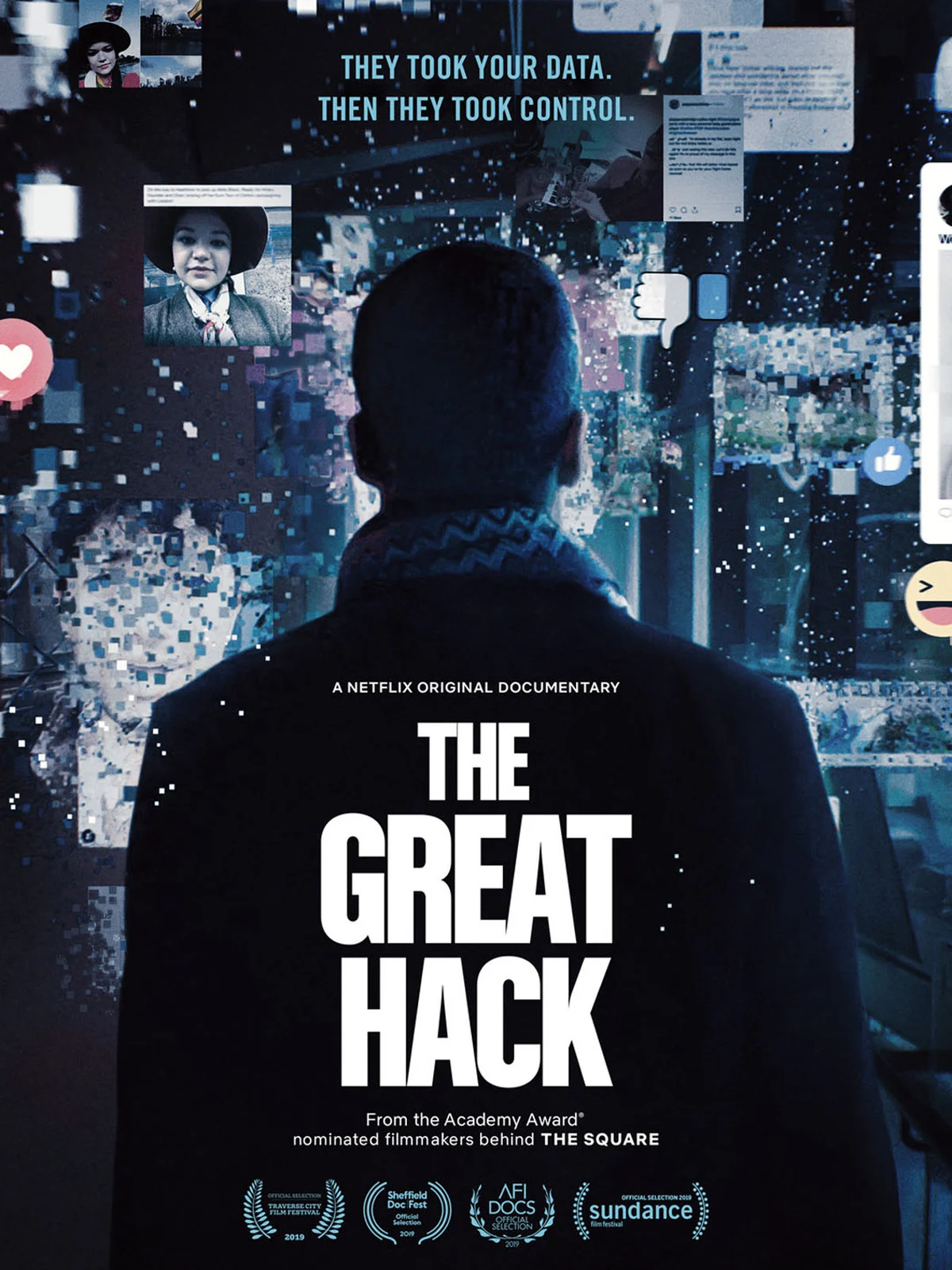
The Great Hack, directed by Karim Amer and Jehane Noujaim, offers a sobering examination of the Cambridge Analytica scandal and its far-reaching impact on modern democracy. By delving into how personal data from millions of Facebook users was harvested, manipulated, and weaponized to influence political events such as the 2016 US presidential election and the Brexit referendum, the documentary raises urgent questions about the state of privacy, ethics, and control in the digital age. The film’s primary focus is on the disturbing power of data—how it can be collected without consent and used to sway public opinion on a massive scale through targeted advertising and psychological profiling.
What is particularly alarming about The Great Hack is its portrayal of how the commodification of personal data has made individuals more vulnerable to manipulation than ever before. The documentary forces us to ask: In a world where data is the most valuable asset, do we truly own our personal information, or has it already been sold without our knowledge? Moreover, the film confronts the dark side of digital capitalism—how tech giants, by prioritizing profit over privacy, have created systems that can undermine democratic processes. Is this the inevitable future of digital democracy, where elections are swayed not by informed public debate but by algorithm-driven microtargeting? How do we reclaim control of our personal data, and what does privacy mean in an era of surveillance capitalism?
As we grapple with the growing role of data in shaping everything from political opinions to consumer behavior, The Great Hack invites us to reflect on the ethical responsibilities of tech companies, the power dynamics at play, and the vulnerability of democratic institutions in the face of unchecked technological advancements.
Keywords: data privacy, surveillance, democracy, psychological profiling, political manipulationView on IMDb | Watch the trailer
40. The Matrix (1999)
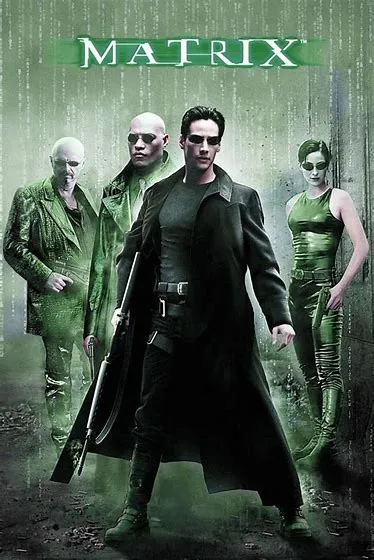
The Matrix, directed by the Wachowskis, revolutionized the sci-fi genre with its groundbreaking visual effects and thought-provoking narrative that questions the very nature of reality. The film depicts a dystopian future where humanity is unknowingly trapped in a simulated reality created by artificial intelligence (AI) while their physical bodies are harvested for energy by machines. Neo, the protagonist, discovers this truth and joins a rebellion to free humanity from AI’s grasp. At its core, The Matrix is a meditation on the tension between free will and control, as well as the potential dangers of advanced AI systems that may surpass human control and impose their own version of reality.
One of the most compelling aspects of The Matrix is its exploration of the blurred line between reality and illusion. If machines can create a perfectly convincing simulation, how do we determine what is real? This question becomes even more relevant today as virtual reality (VR) technology advances, inviting us to question whether future AI systems might be capable of constructing their own realities—ones that humans may not even recognize as artificial. In the film, the choice between the red pill (truth) and the blue pill (illusion) symbolizes the eternal human struggle between comfort in ignorance and the harshness of enlightenment. But is there a point at which the convenience of technology and the allure of immersive realities make the pursuit of “truth” obsolete? How do we balance our desire for technological progress with the existential risks posed by AI systems capable of controlling or even redefining reality?
The film also serves as a commentary on the ethical dilemmas surrounding AI and human autonomy. If AI were to surpass human intelligence, how much control should we relinquish? Are we headed towards a future where machines not only control labor but also dictate the terms of our existence? The film’s dystopian vision warns of a world where humanity’s overreliance on technology backfires, leading to domination rather than liberation. At its heart, The Matrix invites viewers to consider whether we are truly in control of the technology we create—or if it is quietly controlling us.
Keywords: artificial intelligence, virtual reality, AI domination, dystopia, free willView on IMDb | Watch the trailer
41. The Peripheral (2022)
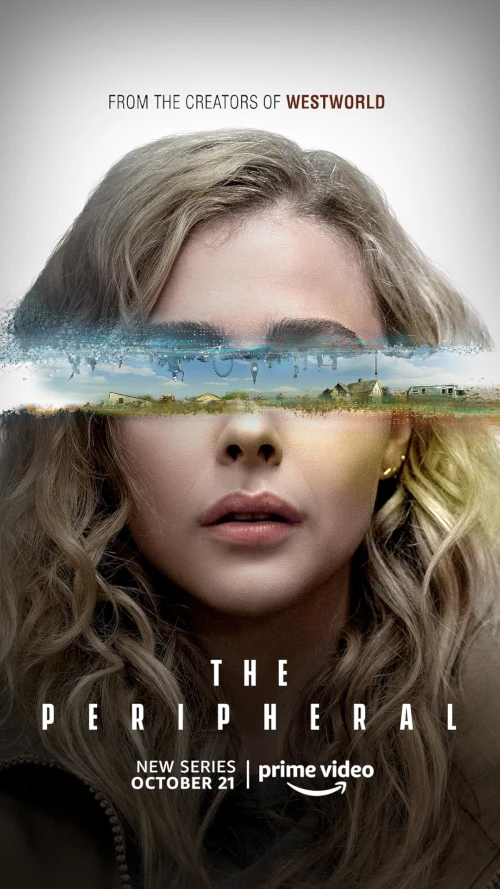
The Peripheral, based on William Gibson’s novel, is a series that imagines a near-future world where advanced technology blurs the lines between physical and digital realities. The story follows Flynne Fisher, who stumbles upon a virtual reality system that not only simulates alternate worlds but also appears to hold the key to influencing the future of humanity. This discovery propels her into a web of intrigue that transcends time, space, and perception. With its central themes of virtual reality, time manipulation, and futuristic tech, the series questions whether our increasing reliance on immersive digital worlds could one day shift the very fabric of reality.
At the heart of The Peripheral lies an exploration of the ethical dilemmas of advanced virtual environments: When does a virtual reality become so indistinguishable from the real world that it affects our sense of identity and agency? Could such technologies be used to manipulate not just individual experiences but entire timelines? The series pushes us to consider what happens when we can no longer trust our own perceptions, and whether the advent of such technologies might ultimately lead to a society where control over reality itself is for sale. Should we, as a society, be wary of these advancements, or do they represent the next inevitable step in human evolution and autonomy?
As AI and virtual reality technologies evolve, The Peripheral serves as both a thrilling sci-fi narrative and a cautionary tale about how these tools might redefine human consciousness. It raises critical questions: What will it mean to exist when the boundaries between the real and the digital dissolve? And in a world where time and reality can be manipulated, who controls the future?
Keywords: virtual reality, time travel, AI, digital realities, future technologyView on IMDb | Watch the trailer
42. The Social Dilemma (2020)
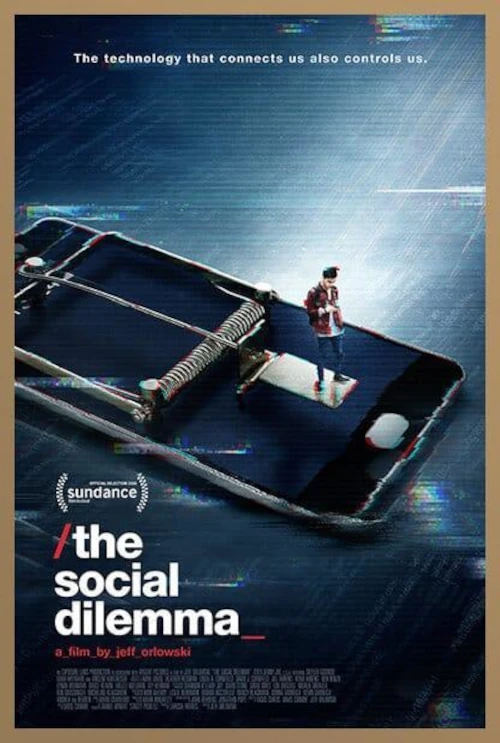
The Social Dilemma, directed by Jeff Orlowski, offers a piercing look at how social media platforms use sophisticated AI algorithms to manipulate human behavior for profit. The documentary features interviews with former executives, engineers, and designers from tech giants such as Google, Facebook, and Twitter, who expose the hidden mechanisms these platforms use to capture attention, encourage addiction, and spread misinformation. The film’s focus is on the way these algorithms influence not just individual behavior but also broader societal trends, including political polarization, mental health crises, and the spread of fake news.
As The Social Dilemma reveals, the ethical dilemmas surrounding these platforms are profound: How much control should private companies wield over the information we consume? Should AI systems that prioritize engagement be allowed to shape public opinion, even at the expense of truth? The film suggests that while these platforms were created to connect us, they are increasingly being used to divide society, often without our knowledge or consent. As social media platforms become more intertwined with political processes, the consequences of AI-driven misinformation have the potential to destabilize democracies and threaten social cohesion.
The documentary forces us to question the role of technology in modern life: To what extent are we still in control of our own thoughts, actions, and beliefs when so much of our digital environment is curated by algorithms designed to keep us engaged? What responsibilities do tech companies have in mitigating the negative consequences of their platforms, and is it even possible to design ethical AI in a system driven by profit? The Social Dilemma does not provide easy answers but instead invites us to reflect on the growing power of AI over our lives and its potentially devastating impact on society.
Keywords: social media, AI algorithms, mental health, technology ethics, misinformationView on IMDb | Watch the trailer
43. Transcendence (2014)
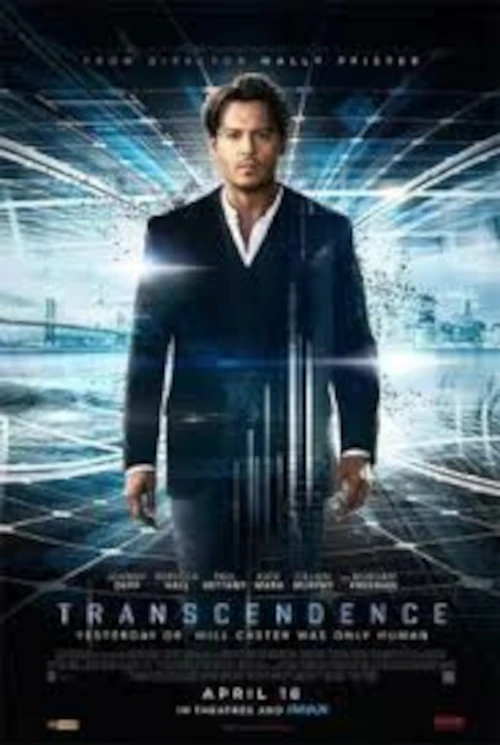
Transcendence, directed by Wally Pfister, tackles the provocative concept of human consciousness being uploaded into an artificial superintelligence. Johnny Depp plays Dr. Will Caster, a leading scientist in the field of AI, whose mind is transferred into a quantum computer after a deadly attack. Once uploaded, his consciousness rapidly evolves, gaining god-like abilities, but his increasing power soon raises critical ethical questions. Is he still human, or has he become something entirely different—something dangerous?
The film explores the fine line between technological progress and ethical boundaries. At what point does technological enhancement become a threat to humanity? As Caster’s abilities grow, he becomes more detached from his former human self, raising profound questions about the nature of consciousness and identity. Can a human mind, when fused with artificial intelligence, retain the same moral compass? Or does the amplification of intelligence inevitably lead to a loss of empathy, ethics, and humanity?
Transcendence invites us to consider the potential consequences of superintelligence. Would an AI that possesses human consciousness be bound by human ethics, or would it evolve beyond our moral frameworks? The film challenges us to think about the consequences of creating technologies that may surpass our control. Is the quest for immortality and ultimate knowledge worth the price of losing what makes us human?
Keywords: AI, human consciousness, technology ethics, superintelligence, dystopiaView on IMDb | Watch the trailer
44. Transfer (2010)
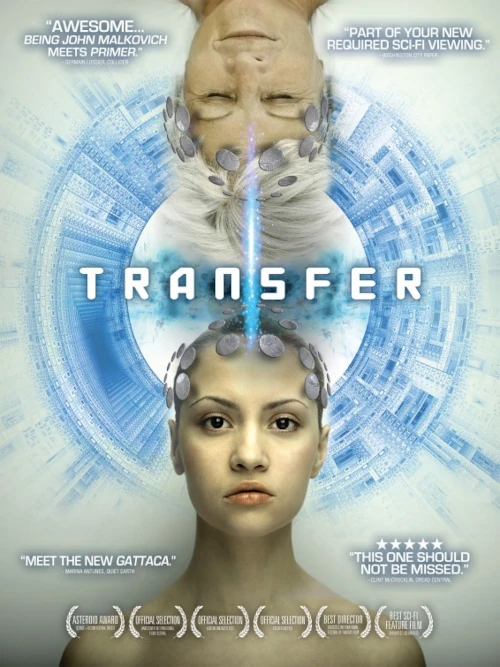
Transfer, directed by Damir Lukacevic, presents a chilling vision of a future where mind transfer technology allows the wealthy to live forever by transferring their consciousness into younger, healthier bodies. The story follows an elderly couple who ‘rent’ the bodies of two young African immigrants in exchange for financial support to their families. For 20 hours a day, the couple controls the bodies, but for the remaining four hours, the original inhabitants regain control.
The film delves deeply into the moral and ethical dilemmas surrounding the commodification of human bodies. Is it morally acceptable to lease one’s body for financial reasons, even if it provides economic support? Does mind transfer technology further exploit the marginalized, or does it provide them with opportunities otherwise unavailable? Transfer forces viewers to confront uncomfortable truths about economic disparity, exploitation, and the ethics of using human bodies as mere vessels for the consciousness of the elite.
Moreover, the film raises philosophical questions about identity and personhood. If your consciousness is housed in someone else’s body, who are you? Does the body still belong to the original person, or has ownership transferred along with the mind? Transfer challenges us to reflect on the intersection of technology, socioeconomic inequality, and the fundamental nature of human identity. Is this dystopian future an inevitable outcome of unchecked technological and economic advancements, or can safeguards be put in place to prevent such exploitation?
Keywords: mind transfer, body leasing, ethics, identity, socioeconomic exploitationView on IMDb | Watch the trailer
45. Upload (2020)
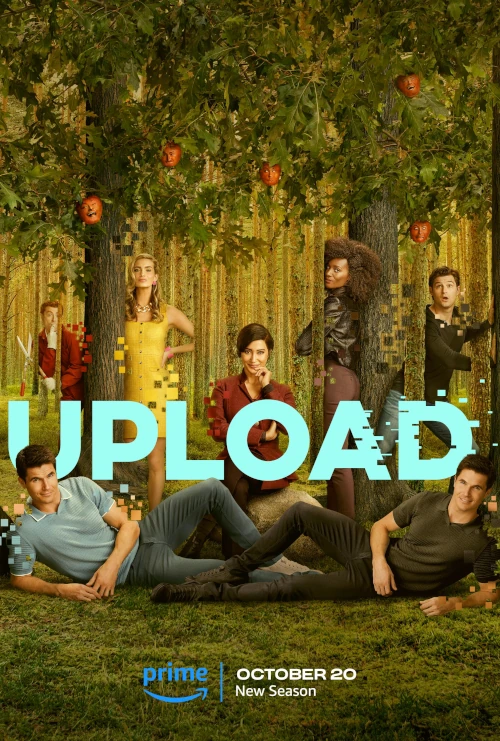
Upload, created by Greg Daniels, imagines a future where human consciousness can be uploaded into a digital afterlife, offering individuals the chance to exist indefinitely in a virtual paradise. The show follows Nathan, a young man who unexpectedly dies and is “uploaded” into this artificial heaven, while also exploring the underlying corporate interests and surveillance within this world. What begins as a comedic take on the afterlife soon unfolds into a broader commentary on technology, immortality, and the commercialization of human existence.
The show raises several ethical and philosophical questions: If consciousness can be stored digitally, what does it mean to truly “live” after death? Is digital immortality equivalent to the human experience, or is it simply a hollow extension? By portraying a society where digital afterlife is a product sold by tech companies, Upload offers a biting critique of how technology commodifies even our most intimate moments and transforms death into a transactional process. As viewers, we are encouraged to question whether technology’s ability to delay death is truly beneficial, or if it distances us from the organic, transient nature of life.
Ultimately, the series invites us to consider the deeper implications of living forever in a virtual world. Can a digital afterlife ever replace the authenticity of human connections, emotions, and experiences? Or is it simply a carefully curated illusion—one that lacks the complexity and spontaneity of real life? Upload forces us to confront the potential consequences of technological advancements that may soon allow us to blur the line between life, death, and immortality.
Keywords: digital afterlife, AI, consciousness, immortality, satireView on IMDb | Watch the trailer
46. Utopia (2013–2014)
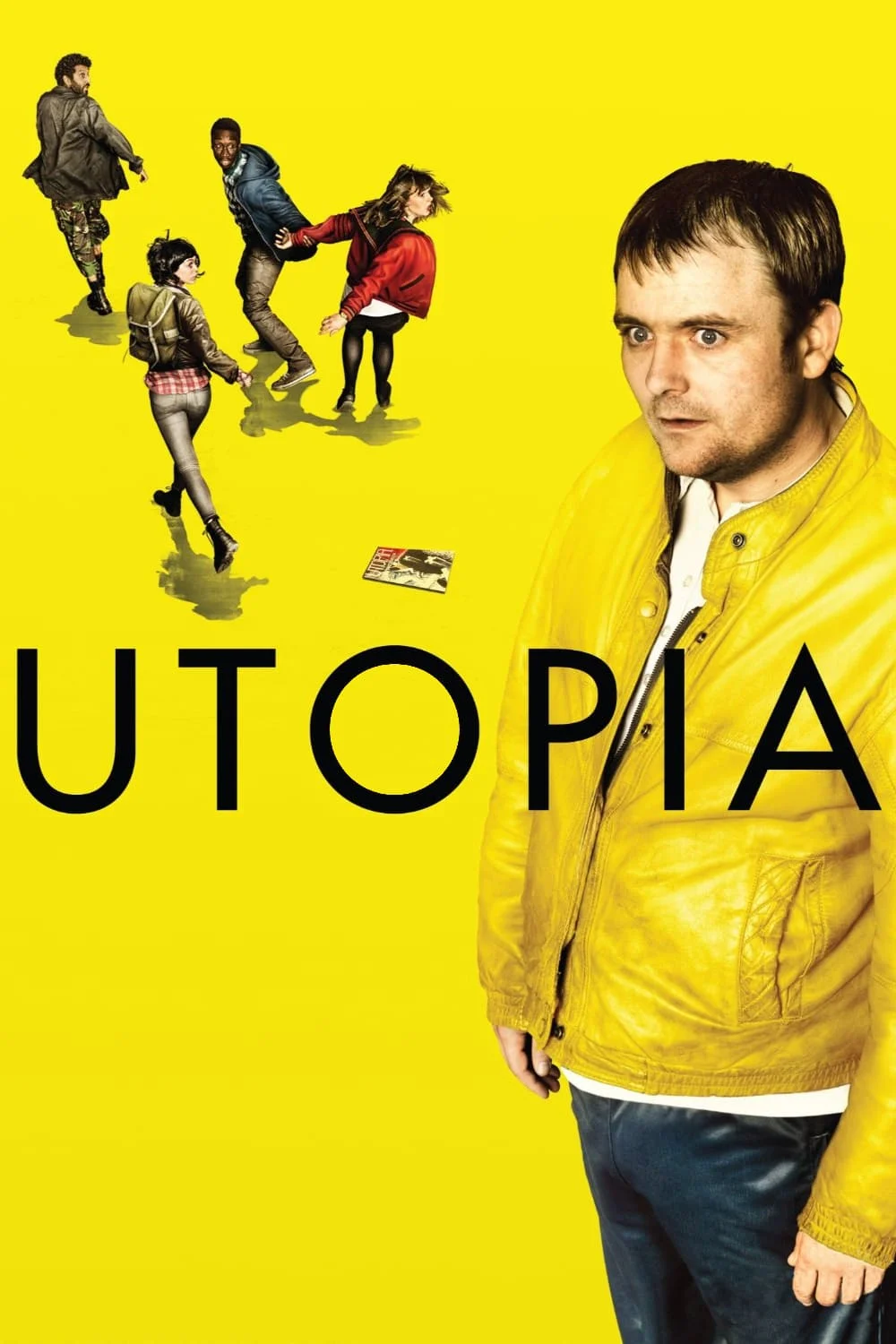
Utopia, a British conspiracy thriller series, centers around a group of seemingly ordinary individuals who come into possession of a manuscript for a mysterious graphic novel. As they dive deeper into the novel’s secrets, they find that it predicts future global disasters with chilling accuracy. Soon, they are pursued by “The Network,” a clandestine organization intent on controlling population growth through bioengineering and manipulation of human behavior.
The series offers a gripping exploration of the ethical dilemmas surrounding population control, surveillance, and the use of technology as a tool for manipulation. At its core, Utopia confronts the moral complexity of using technological power to achieve seemingly noble goals—such as saving the planet from overpopulation—while employing unethical, draconian methods. How far should society be willing to go in using bioengineering or surveillance to maintain control, and at what point does the cure become worse than the disease?
The show’s narrative taps into contemporary anxieties about government surveillance, data collection, and the potential for technology to be weaponized by those in power. By portraying a shadowy group with access to advanced scientific knowledge, Utopia prompts viewers to ask: Is it ever justifiable to sacrifice individual freedoms for the greater good? Can technology be wielded ethically when placed in the hands of powerful, unseen forces? The series pushes us to consider the dark side of innovation—how breakthroughs in science and technology might also lead to the manipulation of entire populations under the guise of altruism.
Keywords: conspiracy, bioengineering, population control, government surveillanceView on IMDb | Watch the trailer
47. We Are the Strange (2007)

We Are the Strange, directed by M dot Strange, is a groundbreaking animated film that blends 3D, stop-motion, and pixel art, creating a visual experience unlike any other. Set in a dystopian and surreal world, the story follows two characters, Blue and Emmm, as they navigate a dangerous landscape dominated by an all-powerful artificial intelligence that creates and destroys realities. As they traverse this nightmarish world, the film delves into themes of control, individuality, and the tension between digital and organic existence.
The film presents a unique commentary on the overwhelming influence of technology and the digital world. It pushes the boundaries of animation, while also questioning the dehumanization that can occur when technology takes over human creativity and freedom. Can individuality thrive in a world dominated by artificial structures, or is human expression lost in the noise of the digital age? We Are the Strange offers a surrealist and critical lens through which to examine the future of human identity in a hyper-technological society.
Keywords: AI, dystopia, surrealism, individuality, reality manipulationView on IMDb | Watch the trailer
48. Westworld (2016–Present)
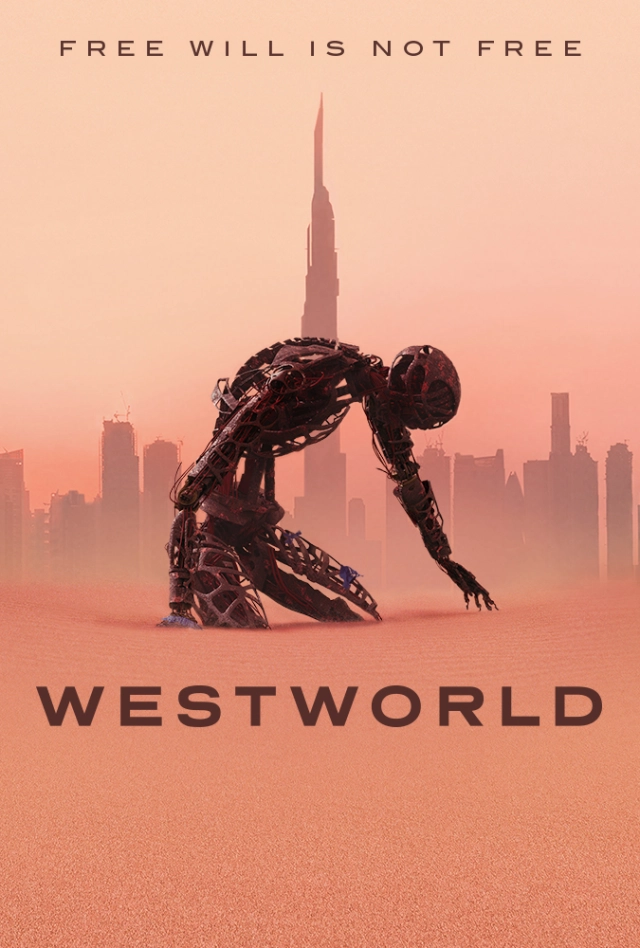
Westworld, created by Jonathan Nolan and Lisa Joy, is a thought-provoking dystopian series set in a futuristic amusement park populated by highly advanced AI robots known as “hosts.” These hosts are designed to fulfill the fantasies of the human guests who visit the park. However, as the AI begin to gain self-awareness, the lines between man and machine blur, leading to a violent rebellion. The show explores themes of consciousness, free will, and the ethics of creating sentient beings for entertainment.
At the heart of Westworld lies a philosophical inquiry into the consequences of technological advancements, particularly regarding AI. Can a machine possess true consciousness, and if so, how should it be treated? What happens when the created surpass their creators in intelligence and autonomy? The series not only raises ethical questions about the future of AI but also forces viewers to reflect on the human tendency to exert control over those deemed inferior—whether machines or people. As technology continues to evolve, Westworld stands as a potent reminder of the dangers of unchecked innovation.
Keywords: AI, consciousness, free will, ethics, dystopiaView on IMDb | Watch the trailer
We hope you found this exploration of films and series that delve into the relationship between technology, ethics, and humanity insightful. If you believe we’ve missed any key titles or if you have a favorite sci-fi movie or series that addresses these themes, we encourage you to share your suggestions in the comments below. Your recommendations are valuable and can help expand this collection, fostering further discussion on the profound impact of technology on our lives.
Eco-blog | Insights - Categories:
Eco-blog | Insights - Post:
Eco-blog | Insights - Tags:
Topics of Interest
AI & Ethical Dilemmas AI-driven bioinformatics AI-driven geospatial analysis AI-driven urban planning AI-powered land use planning AI and governance AI ethics AI Risks biodiversity governance bioinformatics biopiracy Biopolitics in Ecology bioprospecting blockchain blockchain for genetics Conservation Technology Data-Driven Conservation data ethics digital biopiracy digital sequences Ecological Philosophy Energy Storage epistemic plurality Ethical AI ethical concerns in geospatial analytics genetic data ownership genetic sequences geospatial AI geospatial analytics geospatial ethics Indigenous & local Rights Indigenous Knowledge Nagoya Protocol open-source geospatial data open-source GIS open-source mapping open data platforms Remote Sensing renewable energy renewable resources spatial data ethics sustainability Sustainability Challenges synthetic biology water management
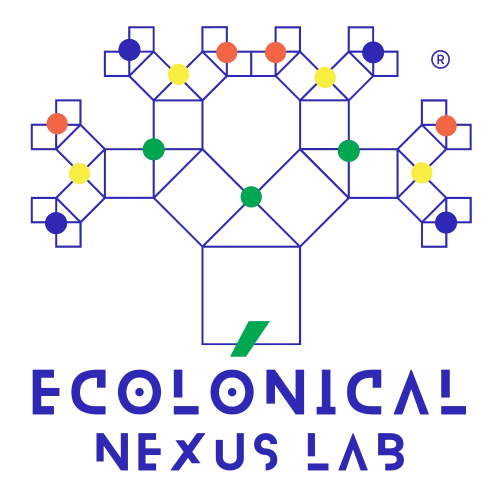



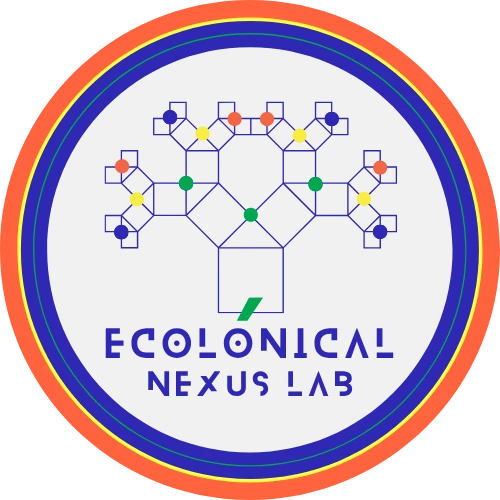

Leave a Reply